#what’s the point of this post you ask?
Explore tagged Tumblr posts
Text
Lockwood & Co Quote x Screencap Posts:
“What Resembles The Grave But Isn’t” x the Portland Row trio
“Hello My Old Heart” x Anthony Lockwood
“Chinese Satellite” x Anthony Lockwood
“Let’s Get Married” x the Portland Row trio
“The Cold” x Anthony Lockwood
“Electric Touch” x Lucy
Lockwood & Co Meta Posts
Lockwood, Courage, Chesterton, & Death
Lucy and Self-Sacrifice
Lucy, The Room, and Fairy-Tales
Creeping Shadow, Unconditional Love, and Selflessness with @magpie-trove
Lockwood & Co Crossover Posts:
B99 x Lockwood & George
Parks & Rec x Lockwood & Flo
John Mulaney x Lucy
The Good Place x Lockwood
The Bear x Lockwood & Flo
Tan France x Lucy
New Girl x Lockwood & Co series
Miraculous Ladybug x Lockwood & Co
James Acaster x Lockwood
BTVS x Kipps
ATS x Locklyle
Lockwood & Co fanfiction:
“harmonies for the left behind” a Mary and Lucy Carlyle story
Other Tags:
Lockwood & Co liveblogging tags: the show and the books
general show tag for reblogs
songs and lyrics for Lockwood & Co
#including the bear post like *james acaster voice* some of the jokes are sad#what’s the point of this post you ask?#well I’m a lockwood blog now and I wanted to fix the tagging system before it was way too late#might fuck around and tag every gifset by episode someday#masterpost
20 notes
·
View notes
Text
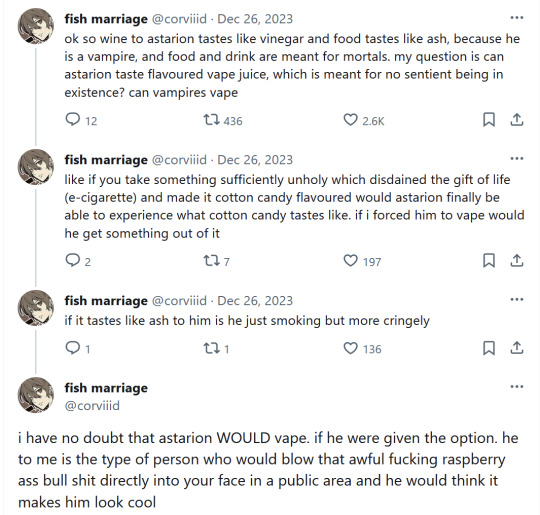
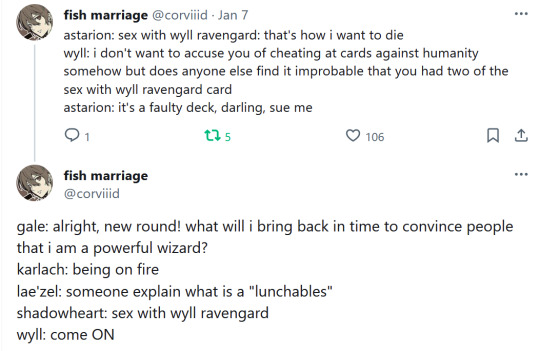



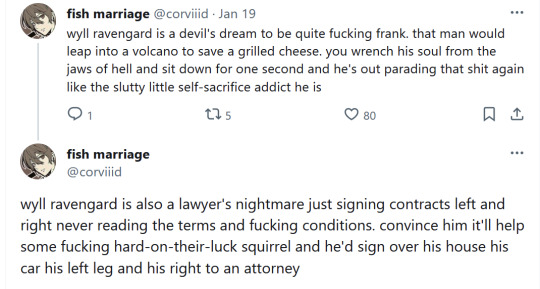
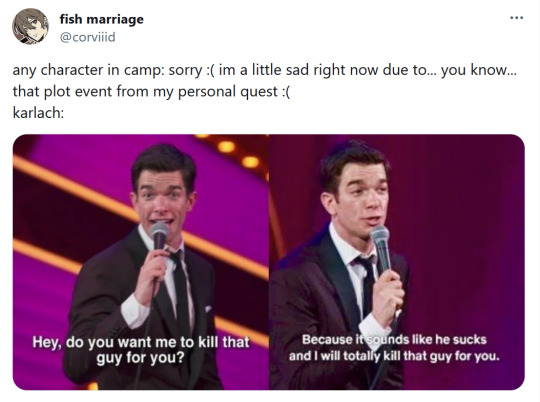
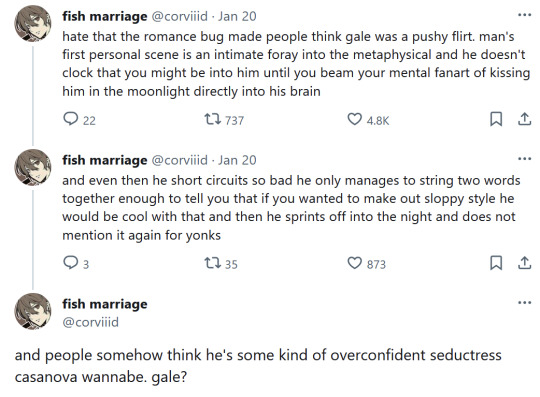



cant shut up about this game for even one second
#bg3#rookposting#astarion#wyll ravengard#karlach#shadowheart#gale dekarios#lae'zel#not as much lae'zel in this one :( sorry miss lae'zel i will make more stupid posts about you when im#done dressing astarion up like a poodle clown and parading him around town#what's a poodle clown you ask? his surname is ancunin#hey rook why do you sometimes leave the notes in and sometimes you dont#great question! it's my quirky little character trait and it points to the deeplore of im extremely inconsistent as a person
3K notes
·
View notes
Text
ultimately when it comes to shipping and fandom space treatment of aspec characters i just don't accept "aro/ace people can still date/have sex" as an answer from nonaspecs. like yeah. mhm. okay. now i think we both know that you're not saying that out of real interest in the diversity of aspec experiences. so you can turn in your seventeen-page essay on why and how you plan to examine this character's aspec identity within the context of a romantic or sexual relationship complete with evidence from canon and peer reviews from multiple aspec people within the next week or i'm putting you in the pit from the edgar allen poe story
#you know. the one with the pendulum#'hey. why are you as an allo person shipping this aspec character like this'#'oh aspec people can still date/have sex!'#'yeah. now can you answer the question that i actually asked you'#like goddamn just say you don't care they're aspec and you want to fulfill a sexual/romantic fantasy with them. that's Fine#it like. sucks. for sure. lotta aspec people will be unhappy with you. but everyone is entitled to their own wants and experiences.#but i'd prefer you just be honest with it rather than using our community's conversation points as retroactive justification#and ONCE AGAIN. you guys are real fucking cavalier with this shit and it shows a real fundamental lack of respect for aspecs#when most of you would NEVER ship a canonically gay character with the 'other' gender. cause again. it would suck.#you can do it. nobody's Stopping you. but it would suck.#and we understand that putting a queer character in situations that erase that queerness is shitty! until it comes to aspec characters!#and whoa... there it is again... people don't consider aspec identities to be queer... crazy how it always comes back to that#anyway. you all know what i'm talking about. have seen many posts about this lately#it is [ long sigh ] unfortunately a very hot button issue with the advent lately of alastor hazbinhotel#which. again. god i wish there were other canon aspec characters to be having this conversation about.#but we'll have to do our best with what we have#aromantic#aromanticism#arospec#aroace#talking#aspec#asexual#asexuality
1K notes
·
View notes
Text
Just thinking about Dick freaking out over losing his title of best uncle to Jason.
Dick showing up to take Lian out and give Roy a break only to hear she's having a fun day with Jason
Dick walking into the room with the toy he knows Lian really wanted, only to find out Jason got it for her first.
Dick showing up to game night at Roy's only to find Jason already there.
Just Dick getting increasingly frustrated and his rival Jason having no clue well the the rest watch on in humor and exasperation. Roy finds the who thing hilarious.
Picturing it all coming to a head when Dick is babysitting Lian and she shows him a new photo they put up. Dick all dejectivly being like, "look, it's you and your favorite uncle."
The pure shock and joy he feels when Lian tells him he wrong and her favorite uncle is "you uncle Dickie, duh!"
The door opening and Lian shouting "Papa!" As dick turns to excitedly tell Roy what Lian said only to see it's Jason who's holding Lian.
Dick just bluescreening.
#dc#dick grayson#jason todd#roy harper#lian harper#batman#Roy being daddy and Jason is papa#Dick being oblivious to his baby bros relationship#nobody is gonna let Dick live this down#bright side is Dick still holds favorite Uncle title#Dick: I thought you were just really good friends#Jasons always there because he lives there half the time.#what's the point of having a rich Bruce if you can't abuse his money and tech to “work” in Gotham well still living with his boyfriend.#dick cries when jason asks him to go with him to pick out a ring#dick cries again when Roy does the same#dick: omg im living in a Hallmark movie rn#part two: features the battle for Grayson. aka both want him as their best man.#i wish i could edit tags because my grammar seems to fail me whenever I write in them.#my posts#jason todd x roy harper#royjay#royjoy#idk
376 notes
·
View notes
Note
Would the Hazel puppet we see in a few of the shows episodes be a kind of very basic changeling? Its obviously made out of way less unwishes than Chimmy but the similarities are too striking to be ignored.
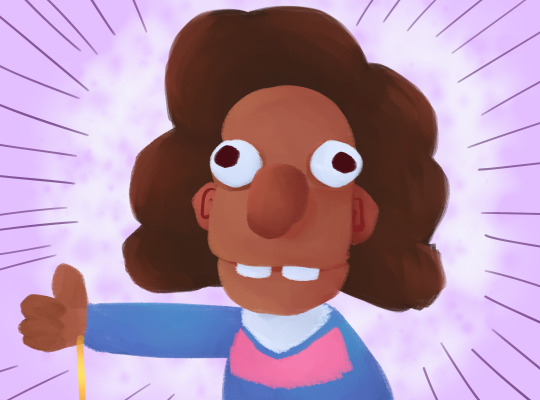
YES! YES IT ISS.
Hazel's puppet is a very basic changeling. So basic, that it's only purpose is to complete one specific set of actions. When those actions are done, it disappears! It's quite literally and physically a sock puppet.
The differences between Hazel's changeling and Timmy's changeling is that their lifespans and construction is different. They serve different purposes.
Bitties Series: [Start] > [Previous] > [Next]
More information about changelings that's ultimately just world building ramblings. Lotsa paragraphs.
Hazel's changeling is short lived, low on unwishes, and more specific to the job.
Her changeling is a one-and-done tool. It only has to do one thing. "Distract the Teacher." "Distract the Mother." So it doesn't need a lot of unwishes, it just needs enough to do its job! As a result, it is made of low quality cloth, it can't verbalize, and it doesn't make its own actions.
Hazel's changeling favors Perceptional Magic. This is why Mr. Guzman doesn't recognize that Hazel's changeling isn't Hazel. He can't see that it's made of felt and sticks. It's constantly pooling out perception magic to warp how its being viewed.
For this reason, the changeling doesn't actually need as much connections as Timmy's does. It can exist by itself, or with Hazel, so long as it has just enough Unwishes to keep it alive. Maybe not stable, but, alive.
By contrast, Timmy' changeling is on the opposite end of this spectrum.
Timmy's changeling is a continuous tool. It must persist and adapt and grow. "Go to school" "Get a job" "Find a partner". It needs many unwishes to face many situations and scenarios. So the changeling has a more difficult build.
The magic it favors is different. Timmy's changeling requires Environmental Magic. People see it for how it looks. It has human skin and can speak the human tongue. But what it requires is a suitable environment. Otherwise, people will know it for what it is. Wooden and hollow.
The more developed and high-tech the Changeling is, the less it's recommended for it to see it's real counterpart. The bigger the amount of Unwishes, the more you want it to be stable and calm. Especially when that changeling's job is "Be Human".
#fairly oddparents#fop#fop a new wish#fop hazel wells#fop hazel#hazel wells#fop timmy turner#fop timmy#timmy turner#chimmy changa#asks#itty bitties fop au#do you prefer a muppet puppet or a ventriloquist dummy?#well that depends on what you need the puppet for#one can entertain children to an extent. but the other is needed for far bigger tasks#if youve seen Coraline then its a bit easier to visualize?#coraline's doll was used to lure her into the 'other world'. it looks exactly like coraline. its made FOR coraline. it APPEALS to coraline.#but the doll for coraline's parents is half assed. all it needed to do was spot the parents. its to the point and that was it.#ahjheh#can u tell im a bit bonkers about this#anyways there's also other forms of changelings for other tasks. you could make one out of porcelain for example!#timmy's was made of wood because it had to be very durable.#hazel's was made of felt because it just had to look like her#although i guess both changelings are a bit flawed somewhat.#OUGGH THE SPEED OF WHICH I WENT THRU TO FINISH THIS#I WORKED SO FAST BCS IW WANTE TO RAMBLE LOTS AND LOTS#i wanted to draw a diagram but then i realized the post woulbd be even LONGER than it should be.
350 notes
·
View notes
Note
do you happen to have that page that talks about the beauty standards of each race?
Yeah sure. While scavenging pics for this I found this neat reddit compilation & chart & theory talk too. I had um, way more to say than I anticipated (I know you only wanted the one page. I have nothing to say for myself. Like most topics in Dunmeshi things snowball because they’re so interconnected. Mercy…) so, many races and observations are only mentioned near the bottom.
Beauty standards and race in Dungeon Meshi
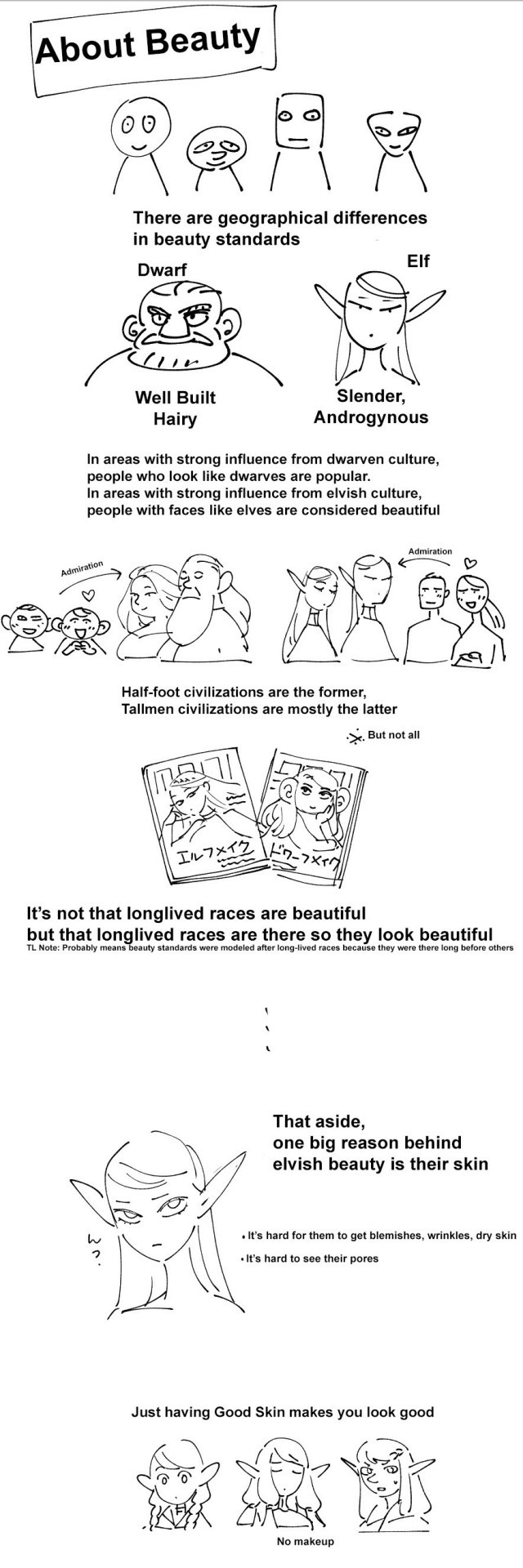

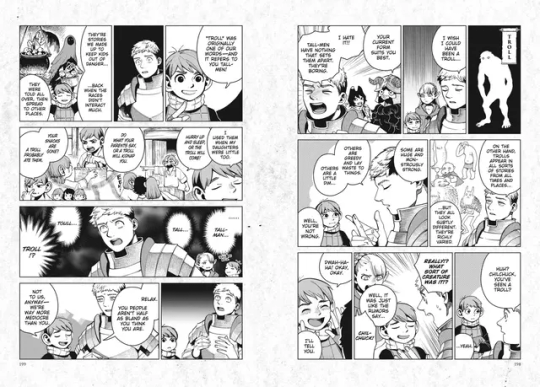
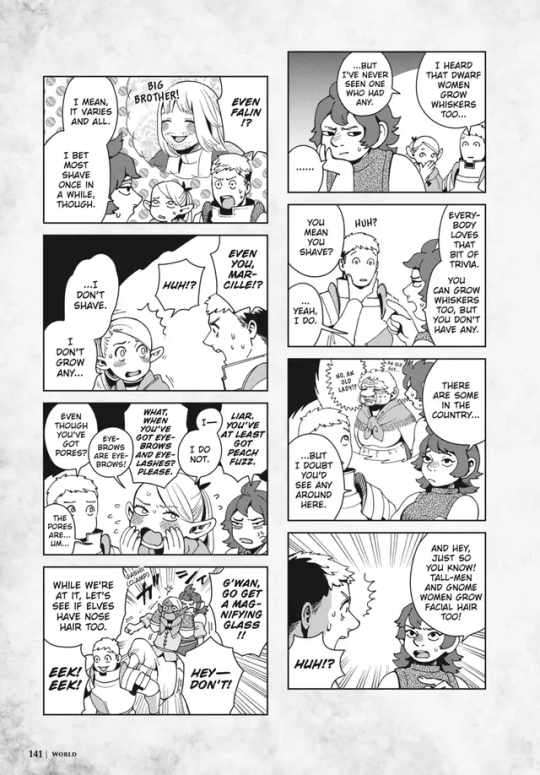
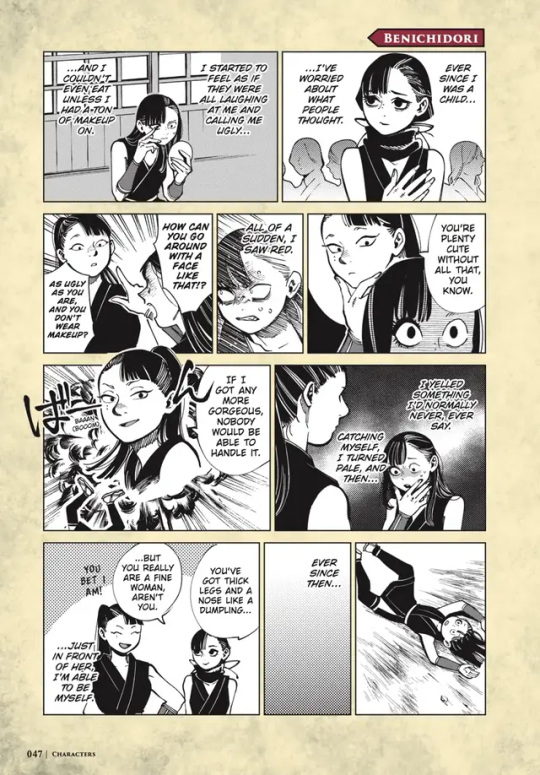

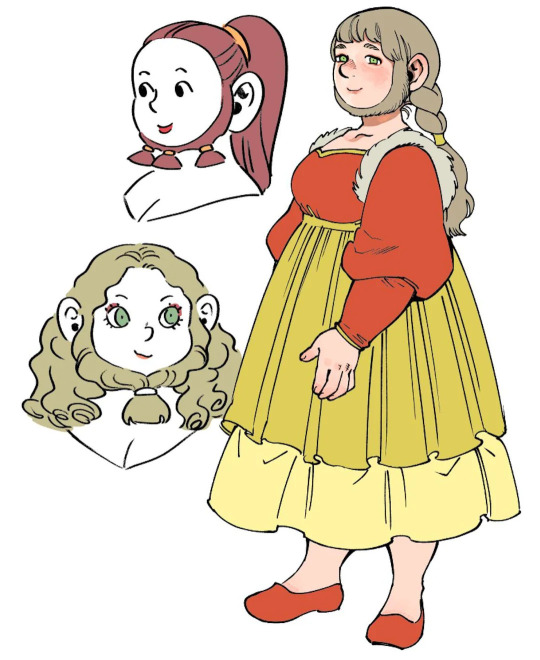
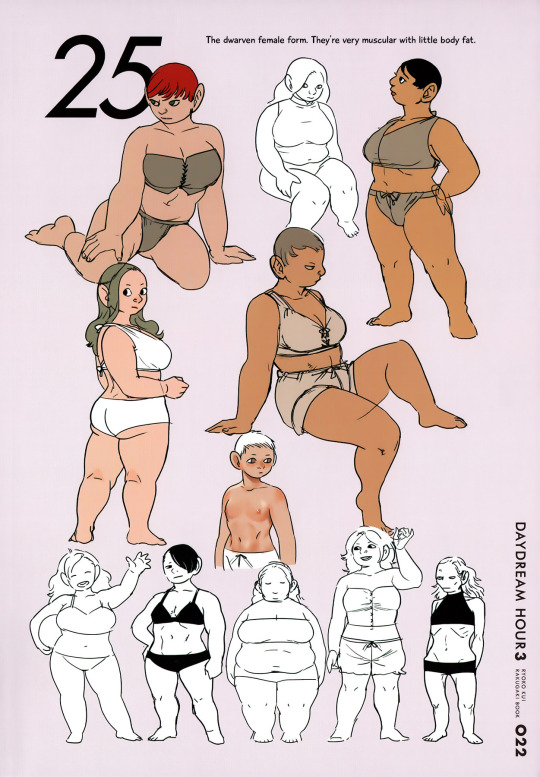
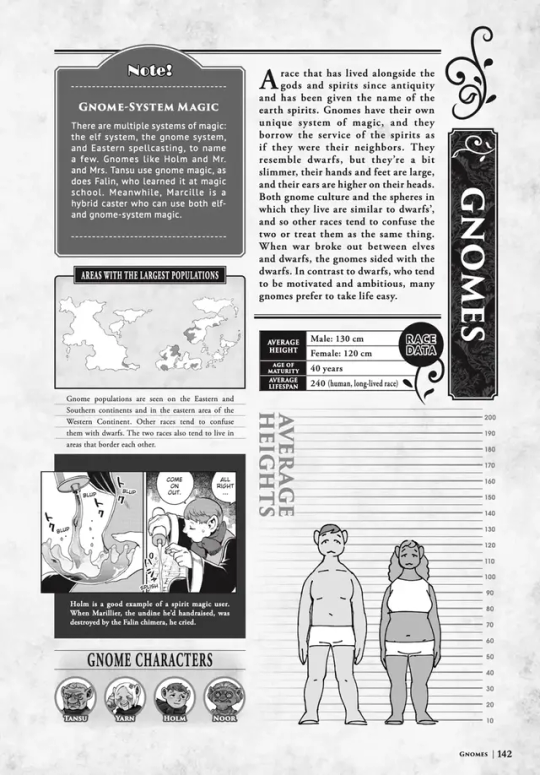

Not pictured there’s also how elven society is harsh on visibly disabled people, and how the demon took away Mithrun’s silver eyes and ears to take away his pride. There’s also how Senshi might have fit in with the orcs more easily because of the dwarven wide body shape, and how they tend to have more body hair too I suppose. In the extra on orcs we see Senshi living with the orcs and he gets judged because of the hierarchy rather than his looks.
What is fashionable also differs from culture to culture, and there’s how tattoos only seem common with elves, though dwarves and others do also sometimes have some. They seem to not raise much brows, which makes sense since for many essentially they’re for professional (magical) purposes especially with elves. Gender roles also differ in type and importance, but generally they are similar to irl ones for the races we see. Elven society seems to be the least gendered, which would be an unsurprising logical outcome of having lesser sexual dimorphism aka they look more androgynous. Comparing fashions and gender roles and how they affect beauty standards would be a whole other compilation and conversation. Kui has great worldbuilding partially because she’s got such a good grasp on sociopolitics and geopolitics. History affects cultures and beauty standards greatly. Kui’s oneshot Distant Utopia was very eye opening on her way to worldbuild and the consideration she gives these things, I do really recommend reading it.
Out of the big 5, we know the least about gnomes, but their sheet does say both culture and region are similar to dwarves’ and they end up being confused together often, so we can imagine the beauty standards are similar to dwarves’ as well.
I wanted to touch on this in a post eventually, but how one daydream hour page said half-foots tended to be curvaceous like in the artwork below puzzled me for a long time, all the half-foot characters we see during canon are rather slender and lanky after all, Chil’s succubi also being more curvy than plump. Economics are for sure a factor in that I imagine, the half-foots characters we see are all implied to be some flavor of poor or malnourished, as are half-foots depicted as empoverished oppressed minorities in general. Even comparing the artwork with the half-foot sheet’s depicted average half-foot, the ones on the left seem bigger. Wouldn’t it make sense though, if unlike dwarves half-foots don’t have similar naturally wide bodies, yet due to idolizing dwarves they work towards having a similar body shape/type to emulate them?
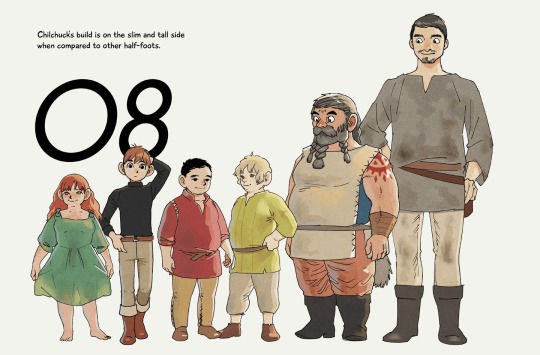
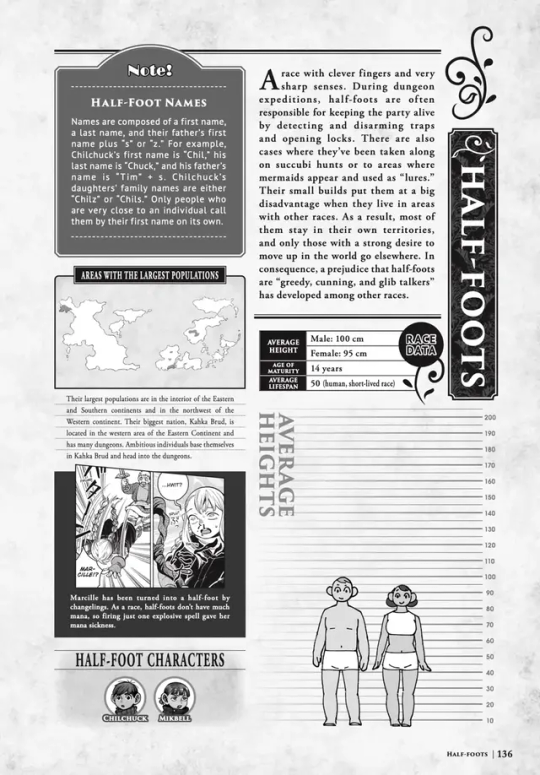
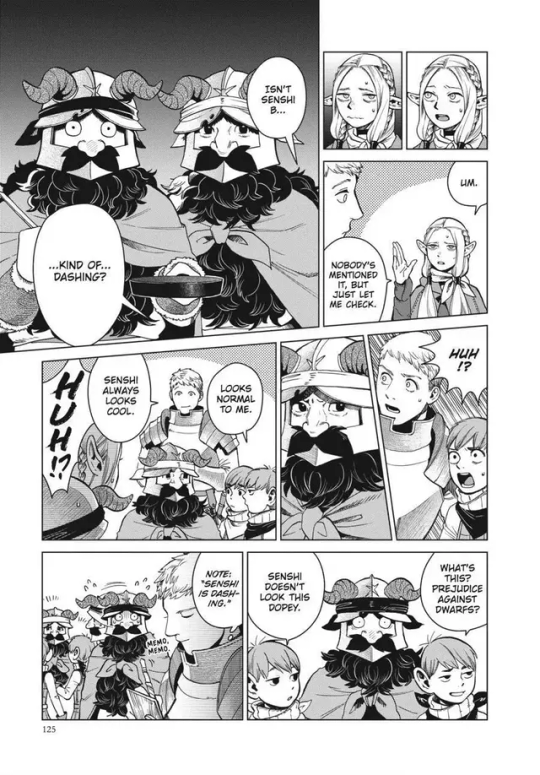
It’s said half-foots tend to stick to pretty ethnically homogeneous regions (aka half-foots-only communities) unless they move to the big city with ambition to try and make it big (like Chilchuck and his wife & kids did), and that’s interesting imo because then that would mean that in a ton of half-foot communities, they rarely see or interact with dwarves whom they try to emulate. Of course, one thing about beauty standards is that when they get adopted, at one point it stops being "this is how dwarves look and so this is how half-foots should look" and just becomes "this is how half-foots should look", most people feel as though beauty standards aren’t learned but innate, so I figure the half-foots wouldn’t have any problem still seeking dwarvish traits when there are no dwarves around.
There’s also stuff you can glean here and there if you want to extrapolate more. Like how in the race swap artworks, Mickbell is only smiling in the dwarf portrait, and Rin’s elven portrait looks very close to her elven one- Rin who is stated to be beautiful in her profile blurb. Benichidori’s extra does teach us tallmen can definitely have harsh beauty standards, but also since the text portrays her as very dysmorphic that’s likely reflected in her thoughts to a much more intense degree than is common, not an accurate strict baseline to go off. Ah, Kabru’s blue eyes are also why he and his mother lived a rough life in Kabru’s hometown, but that seems to be regional. Good post here on the topic of Kabru’s blue eyes and ties to irl history. There’s a lot to be said about Kabru being a man that in many ways is close to elven beauty standards, and how that might have affected or been affected by his upbringing with elves + his persona as someone that can effortlessly charm most people. Marcille’s section here in this essay also goes into Marcille’s struggles to fit in with the ideal image of an elf.

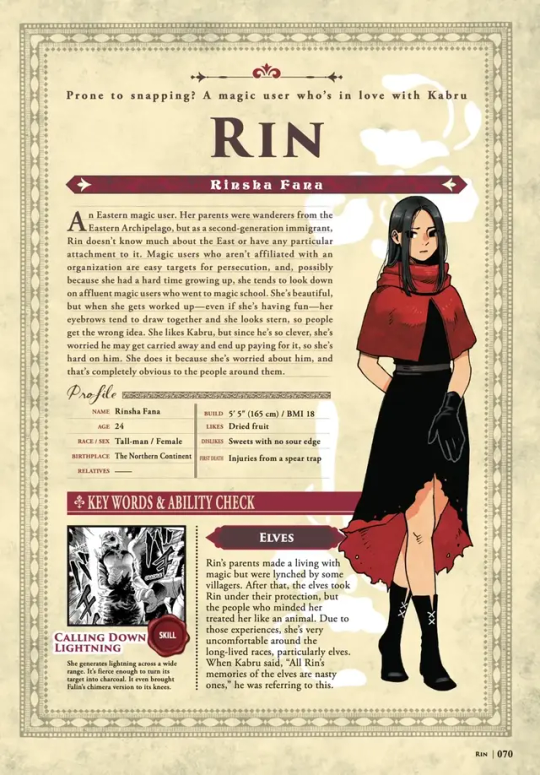
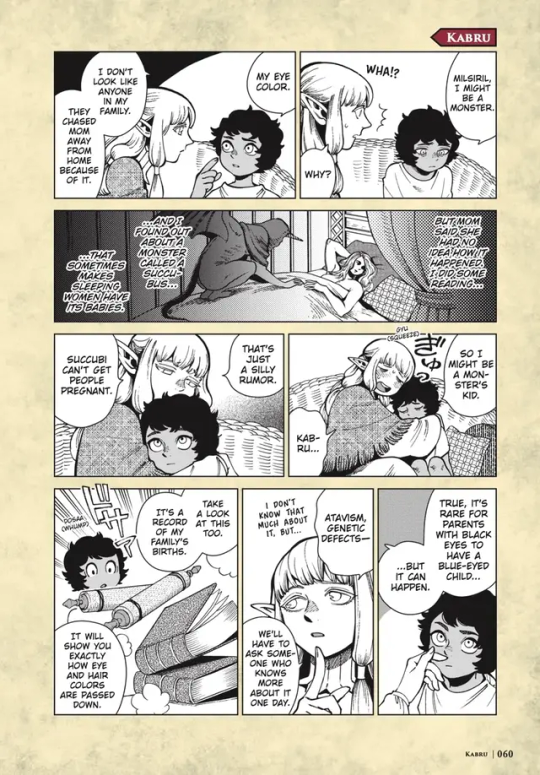
Looking human
Also notable are beastkins and demihumans: Demihumans are all dehumanized which makes people treat them worse. So if you differ from the visual idea of "human" (an in-world subjective categorizatiom just as much as demihuman is) most people do judge you negatively. Elves and dwarves get to fight about which type of human is considered the prettiest, but demihumans are below tallmen and half-foots, they are considered as simply below the beauty contest, incompatible with it.
Onis are perhaps the demihuman people we know of with the least cultural influence on the dunmeshi world, and with less intensely different appearances than other demihumans, but even them are treated as lesser than human, treated as beasts to slain for reputation points or useful strength to have around and command. It’s said their "magnificient horns" and fangs are often shaven off when the oni lives in tallman towns, so you could easily make the argument that onis are denied the right to have their own beauty standards, having to conform to other people’s and going through mutilation to take away features they might otherwise have taken pride in. Inutade was bought by the Nakamotos from a dangerous sumo fighting ring that got one of Inutade’s tooth broken on her first and only fight. Remember when I said different fashions existed in dunmeshi and how those could also affect beauty standatds? Like the elves, if you look at the portraits pages that include a lot of characters that aren’t in the story you can see distinct cultures within the same races, for example one young elf is bald which is in sharp contrast with usual elven long luscious hairstyles, and that’s especially true for onis I think. Maybe not only from different regions but different eras as well… They have a bit of population in the very north of the western continent, so I like to think some of the ogres live in very cold, maybe even subarctic conditions. The point I’m getting at here is that within a race, culture/ethnicity like with Kabru as well will also influence them, different communities will have differing beauty standards. The oni history blurb and third row first collumn portrait remind me of Mongolia (which historically was a lot of different nomadic communities with different cultural identities as well. Something something, the oni empire experienced a decline and then tallmen overpowered them, and now they’re governed and split apart by stronger social classes & slavers and the richness of culture was hurt for it), but obviously many of them are dressed and look rather japanese, makes sense considering living in/close to Wa, and first row second collumn portrait reminds me of ainus which again would be logical considering geographical placement, though I’m far from an expert. Interestingly, ainus are indigenous people both in Japan and Russia- Perhaps the northern western continent ogres are meant to be closer to Russia than Canada like I imagined? Ok tangent over.

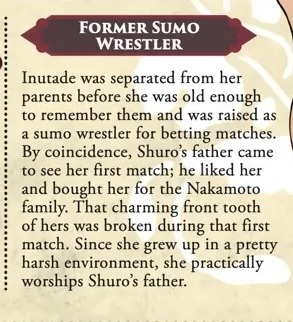

The kobold sheet says they’re especially sought after as slaves because they’re "adorable", but locally in the western continent they’re repeatedly said to be seen more as ferocious and dangerous. The dehumanization is most apparent in the first comic below. The language barrier and conflicts no doubt worsen this by a lot, but I think it’d be hard to deny that their canine appearance makes the dehumanization worse. "They’re ferocious beasts, they’re demihumans, they can’t be communicated with". Most characters in Dungeon Meshi’s world are desensitized to slavery and most characters are prejudiced one way or another. Point being, kobolds are fully removed from human beauty standards, but no doubt for kobolds, other kobolds are more beautiful than humans are. They’re assumed to be an uncivilized bunch, but just like any other people they like to aforn themselves with nice clothes and jewelry and keep themselves clean and groomed; they too take care of their appearance and take pride in it.

And the orcs! This one we have the most contact with in canon, with not only there being foreigner characters from the ethnicity or hearsay of their homelands and culture but full on contact with a community. We get to see up close what they’re like and what they think, and of course in turn they’re our introduction to how demihumans are harshly looked down upon and seen as inferior, less human and thus less worth valuing and less dignified. It’s text that orcs are ugly to most humans and humans are ugly to most orcs. Since I judged they didn’t need accompanying explanation the pictures showing this are in the pictures dump at the top.
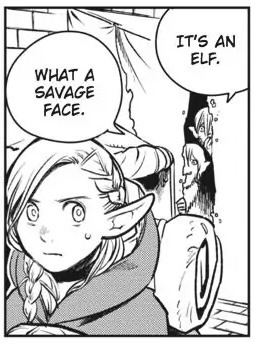
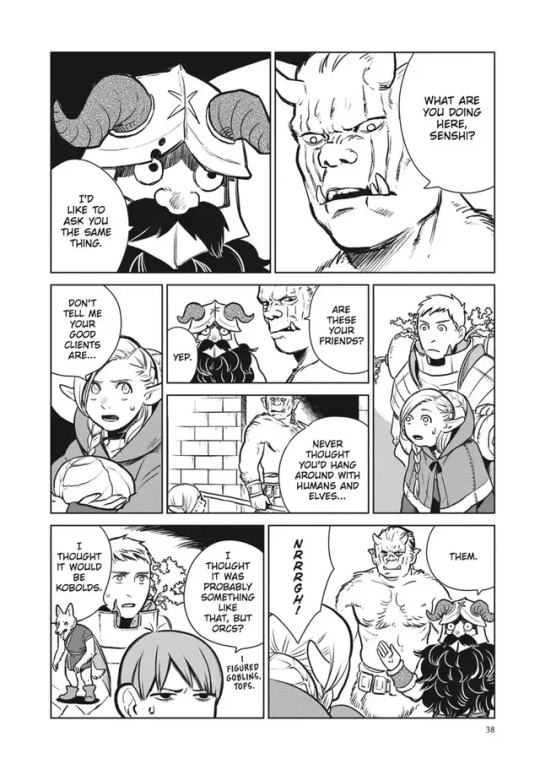
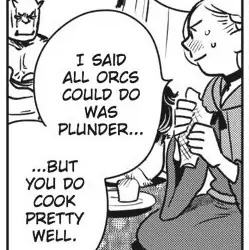
God forbid you sell vegetables to orcs my god- but then again they do basically mandate adventurers to kill any orcs they come across so yeah the world isn’t above that even a bit.
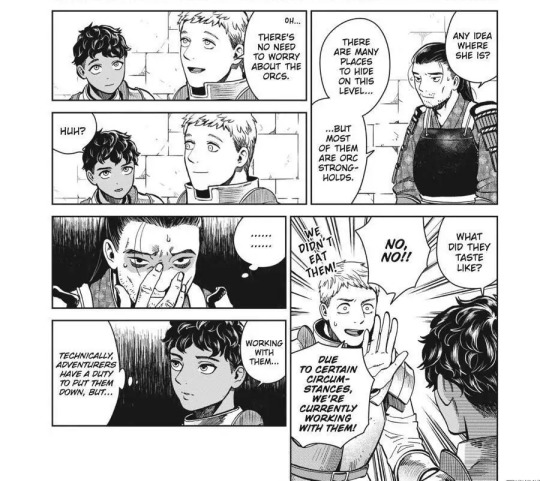
So yes, my main point here is simply that orcs are yet another evidence of the physical ideal of "human" being an important beauty standard for human societies globally.
Izutsumi is our glimpse at how beastkins are treated in the world, and in Wa at least that’s ending up being caged and mistreated as part of a freak show. Izutsumi hates her appearance and wishes she could leave the feline part of herself behind to only be human. Interestingly, not that we have a lot of info on them so this is very much a take with a grain of salt situation, but there seems to be less stigma around artificial beastmen, those who can shapeshift at will. The main difference is of course appearance, that most of the time they simply look like average tattooed humans. Artificially creating humans is an illegal practice, and no doubt it’s not well regarded, but being able to hide that makes them less likely to be discriminated at any moment, or even just discriminated less intensely. Again, looking human is important, not only for belonging but for safety’s sake. Beauty standards rule the world with harsh hands.
Mermaids and fishmen
Ok we’re done now right? Right-! But wait… Wait…! Mermaids and fishmen are said to be demihumans too, special separate cases to the main three demihuman species however, which is also represented by how mermaids and fishmen both are in the Adventurer’s Bible chapter Monsters meanwhile ogres, kobolds and orcs are in the chapter World. They’re an interesting topic because they directly tackle this topic, not only in a meta way for the readers but also making characters themselves struggle to quantify their humanity with the goal of knowing wether they should be eaten or not, especially Chilchuck. Chilchuck’s "is it really just a matter of feelings?" mini arc.
The party asking themselves "Should we eat this?" is very common, and often they end up playing a little loose on morality, like eating the red dragon’s meat despite it having digested Falin. Not unsimilarly Marcille freaks out a little over the vegetables they harvested having been grown with fertilizer, aka largely human poo. Half of the motivation of "should we eat this perhaps sentient creature" is out of consideration and compassion, but more strongly and more often, the characters struggle with a sense of taboo at eating something too closely related to humans. Even, feel uncomfortable because of the deepseated impression that eating it would dirty them in some way. Cannibalism is an interesting and relevant topic in many ways, but what I want to mention is how there’s the more or less universal belief that committing cannibalism inherently taints you as a person and turns you more monstrous, morally but also literally depending on some myths such as w*ndigos and onis in some cases, like in Touge Oni. Marcille and Izutsumi both express a fear of eating monsters turning them monstrous. Maybe this is part of what Laios was hoping for, honestly. There are two fears here, if eating a demihuman monster constitutes as cannibalism or not, and so, will eating it taint you because it’s a human, or will eating it taint you because it’s a monster? You are what you eat, until it’s a little too literal. You morally are the means by which you get your food, and you physically are the result of your nutrition. Dungeon meshi manages to mix an exploration of humanity with the theme of food because our relationship to food is very deep and complex, psychological as much as physiological.

In the end, the characters sort of shrug and accept that they’ll never quite understand the world of mermaids and fishmen and how they operate, and what that means about them. Laios is the one always challenging these notions other characters take for granted, it’s not obvious to Laios why people are softer on mammals than other animals and plants, it’s not obvious to Laios why people would be afraid of eating a monster just because it’s a monster, it’s not obvious to Laios why some food is gross to Marcille but not fish testicles, it’s not obvious to Laios why you should immediately regard orcs and kobolds badly.
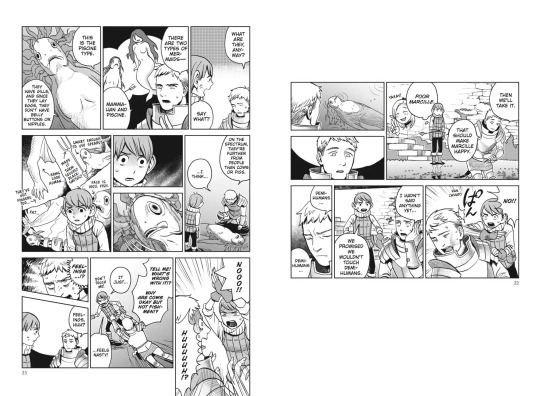
"Cows are probably closer to humans [aka closer to being human] than fishmen, though they’re clearly intelligent", dehumanization to lessen empathy towards them to be able to eat them. Meanwhile, mermaids seemingly have a less noticeable "civilization" or intelligence, they hunt in groups like fishmen, but they don’t use tools and such, they feel more primal and similarly instinct driven, and yet… Do they attract sympathy more? Mammals, humans, is it because of their nature or because of their appearance?
Both the nature and appearance of fish are ones people don’t typically sympathize with. "Fish don’t feel pain", "goldfish only have 5 seconds of memory", "it’s okay to keep fish in completely empty bowls too small for them until they die from it", so many lies and misconceptions exist that make people less considerate of them. The average lifespan of a goldfish is 10-15 years, the record is 43, but they’re not seen as lives that really matter, so a lot of goldfish die in a few weeks of bad aquarium conditions. There’s a lot of research on animals evolving to look cute and appealing to make some predators want to kill them less and parents want to care for them more, including humans. First good google research result gave me this credible short article on the topic. In Chilchuck’s weighing wether a fishman is far enough from being human or not to eat, "face is 100% fish" is his biggest argument for it being more acceptable. The face, the most important thing for empathy and recognition. The face, the decapitated fishman one that falls into his hands next chapter.
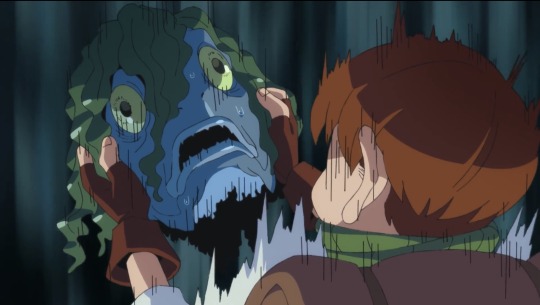

To quote @room-surprise: "Chilchuck can't explain why it's wrong to eat the merpeople, even though it's NOT complicated. But the problem is Chilchuck would have to accept and acknowledge that the merpeople might be people? And that's outside of the worldview he passively believes, so he can't just say that, because he doesn't think that's true. But that IS why he "feels" it's wrong. And it's all you'd need to say for Laios to understand! But it would require acknowledging that maybe the way they're treating and talking about the merpeople is wrong."
The idea of Chil not being able to grapple with how maybe some monsters are more humans than they seem, him who had been an advocate of half-foots rights, half-foots who get undermined and treated as inconsequential sacrifices… Grappling with how he could relate to the merpeople’s situation almost, and pulling away because it’s so existentially horrifying. I do not want to see myself into an hostile fish-faced warrior I can’t communicate with. In a way this also relates to Chilchuck being the only party member who doesn’t see Izutsumi as a cat in the relationship chart, the only one to treat her with full human dignity. He knows the struggle to be taken seriously, he knows being infantilized and he knows what it’s like to be treated as less than human.
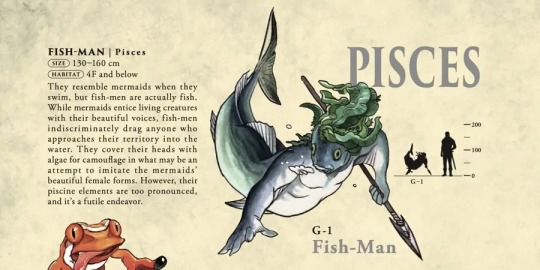
Below, you will see Chilchuck draws the line of where they become not okay to eat as when "they already look like mermaids". Above, there’s speculation that the algae hair is partly to mimic "the mermaids’ beautiful female form". Is it because mermaids are their enemies and the ambiguity might give them extra seconds to attack or flee? Is it to trick adventurers instead? It’s striking to me that this is what works, with the adventurers. Sure the fishmen are intelligent, but explicitly here, what makes them no longer acceptable prey to Chilchuck is that they look close enough to a mermaid, close enough to human. Mermaids who of course themselves have this form to entice and seduce and charm the adventurers they prey on. Chilchuck considers the intelligence due to the tridents, but most of his internal debate centers around their appearance, and the image of a fishman skewered sickens him. The power of mimicry… Mimic being a beautiful human woman. Mimic being cute, babies being wired to make us feel protective and softened. Half-foots, sometimes pretending to be children for scams or help or avoiding trouble.
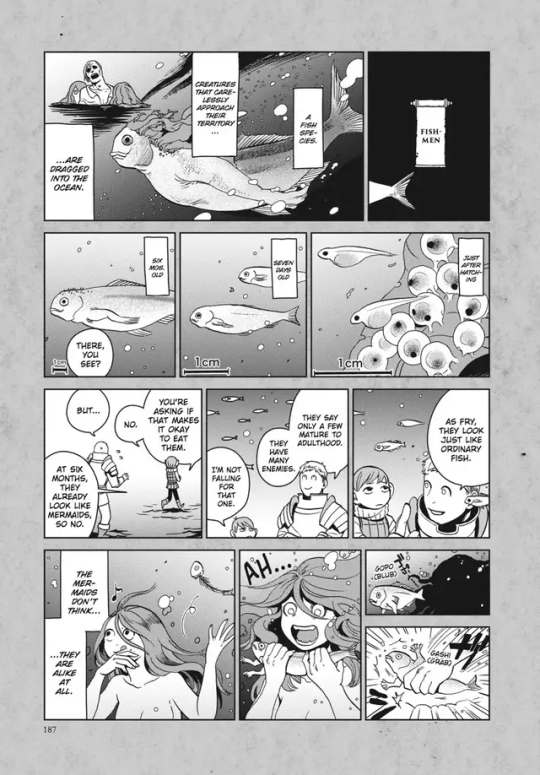
The mermaids are only concerned by their differences and not their similarities, and have no trouble treating the fishmen as food rather than peers. To an outside perspective like us, the audience, all these categorization of "more human" and "less human" between onis and orcs and elves and tallmen etc seem stupid and unfounded, but to the people living in Dungeon Meshi’s world, elves may as well be mermaids while onis are fishmen, not alike at all, unworthy of empathy and thus fine to eat.
Ultimately, Dungeon Meshi promotes unity. It’s about seeking to understand the unknown and the misunderstood, the dehumanized and the inhuman. It shows the good that comes from seeking to understand what you do not, even when that’s one another.
#Dungeon meshi#dunmeshi lore#Compilation#Ok… I think I didn’t forget anything. Feel free to point things out or discuss in comments and tags though#Delicious in dungeon#Ik i strayed a bit from the central topic but who knew beauty standards and discrimination went hand in hand /s#Ask me about my dunmeshi kobold oc……….. ask me about my dunmeshi ocs……..#Can we give body neutrality an amen#Tw racism#cw racism#The “what are you talking about Marcille. Senshi is handsome” gag has 2 layers then doesn’t it#Like obvi Marcille is noticing the difference between shapeshifter and og senshi rather than making a judgement#But the elf being *the* one to notice and say “Senshi looks more handsome than usual that’s weird??” may very well be an effect of living#with elven beauty standards yeah#Meta#I wanted to make a post on the half-foots body type thing and the oni mongolian coding and the chilchuck merman thing so#Three in one 🎵 why take the initiative when you can just wait for the tiniest opportunity#Chilchuck tims#Analysis#dunmeshi fishmen#It’s very interesting to think of how there being so many people *that* physically different affects politics and beauty standards#Mimics…. Pacing my room. Pondering. Mimics………#The burnout is over yippee#Ok but for reals though race is largely a social construct. Critical race theory good. Go read Distant Utopia by Ryoko Kui#‘Yeah sure.’ < person who thought she’d just be grabbing like 3 pics and had no clue she’d become hyperfocused for hours#The classic societal obsession for classifying and exaggerating physical traits into boxes of innate goodness vs evil…
238 notes
·
View notes
Note
How do you feel about the fact that Katsuki’s apology and his death are not brought up again? I was really sad they never talked about it all. Do you have any headcanons for when/how/if they ever talk?
Dear anon, you've activated my trap card.

By which I mean you've asked me about something on which my feelings apparently vastly differ from those of most people.
To answer your question, I did not expect nor even want a scene addressing the apology again in-canon. Neither did I expect a scene where they discuss Katsuki's death, though I was less opposed to that.
But let me specify this right off the bat: there is a distinction between what I would enjoy seeing and what I think has narrative weight.
And I think that's fascinating to talk about. You asked me how I feel, so get ready!
When people say they wish Katsuki and Izuku had talked about his death, what are they wanting?
Do they want to see Izuku get vulnerable and choked up over Katsuki, shed tears for him? Do they want to see Katsuki see him like that, and watch him soften and let Izuku open up? Do they want to see him take Izuku's hand and comfort him, reassure him that they won, that it's over, that he's still here, and no one is gonna keep him from getting back up again? With the implication that getting back up again means standing at Izuku's side and helping him win?
I sure as fuck do!
But do I think that kind of scene does something for the story, themes, and development of them as characters that what we actually got doesn't do? Not necessarily.
See, stories are not driven by what the audience wants to see.
Stories are driven by what the characters need.
Not what they want, what they need. Often, characters are denied what they want because it does not align with what they need, and this is the very premise of their struggle. Katsuki is a great example of this, because at the start of the story, he wants to feel superior to Izuku, but what he needs is to accept his own admiration of him.
Fanworks exist to give the audience what they want, in a vacuum, totally separate from the linear structure of the narrative. You can just pop into a scene of Izuku crying and have Katsuki kiss him better and that gets us every time, doesn't it?
But in the manga, for a scene like this to exist, there has to be a need for it to address. So, what would that need be?
I think people ask for these scenes because they are under the mistaken impression that Katsuki doesn't understand how Izuku feels about him. And I cannot tell you how much I disagree with this.
If Katsuki didn't understand that Izuku cares deeply for him, then a scene like what I described would probably be intended to tell the audience that he needs to understand how Izuku feels and, up until now, he hasn't.
But that's not true.
Katsuki knows Izuku cares about him.
At the start of the manga, Katsuki is convinced Izuku looks down on him.

Chapter 10
We the audience understand this is projection. Katsuki's admiration of Izuku makes him feel inferior, so he rejects his own self-critical feelings and assigns them to Izuku. No matter how many times Izuku shouts that he thinks Katsuki is amazing, Katsuki's inferiority complex is unfazed.
He utterly ignores it, it doesn't even register for him.




Chapters 10 and 119
Instead he doubles-down on his own frustration and dissatisfaction with himself, engaging from a point of competition, as though Izuku had insulted him rather than complimented him.
This tells the audience that the problem does not lie with Izuku, but with Katsuki himself. Izuku cannot resolve this situation with words, we've seen him try. Instead, Katsuki needs to change his own perspective.
After Deku vs. Kacchan 2, Katsuki accepts—begrudgingly and with great discomfort—that Izuku does not look down on him.

Chapter 120
Even though Katsuki reconciles this, that doesn't change the fact that he is weak. He needs to grow as a person and as a hero. Now, his struggle is not just about his self-perception, but also his real progress.

Chapter 209
We joke about Kacchan being a tsundere, because he is, but part of the reason he rejects Izuku's appraisal of his progress is because he still hasn't met his own standards yet. Katsuki admires Izuku and All Might so much; he knows what they are capable of, he sees the gulf between where he is and where they are, and he is fighting like hell to close that gap.
He won't be satisfied until he does.


Chapters 362 and 409
I've seen people talk about this moment like it is a revelation for Katsuki about Izuku's feelings.

Chapter 359
And, first of all, lemme just say that no villain has ever said a damn thing to Kacchan that he didn't already know.

Chapter 358
ShigAFO's comment does not exist to confirm Izuku's feelings to Katsuki. It exists to signal to Katsuki (and the audience) that ShigAFO knows how Izuku feels, and he is prepared to use it against them.
This is a threat. This is about instilling horror in us and bringing to painful fruition Katsuki's fears about being a weakness people can exploit to hurt Izuku.
But let's not bury the lede: Katsuki would not have these fears if he didn't understand that Izuku cares about him.

Chapter 82
Look at his face and tell me he doesn't know with every fiber of his being that Izuku would die for him.
You could argue that because Katsuki understands Izuku's heroic nature better than anyone, perhaps he doesn't consider Izuku's protectiveness of him unique. Maybe he doesn't understand that Izuku loves him specifically and, to him, this is simply an expression of Izuku's selfless, save-to-win mentality.
But that I counter with two points:
Katsuki is not dumb, guys. He is our most emotionally intelligent and self-aware character. We are shown on numerous occasions that Katsuki can read between the lines and understand someone's feelings without being told (unlike Izuku, who's a damn nerd).
The story arc of Katsuki and Izuku's relationship is predicated on the fact that Katsuki rejected Izuku, but they are both unable and unwilling to truly disentangle themselves from each other. This means that their interactions, across the whole of the series, generally focus on Katsuki accepting Izuku and his own feelings, thereby restoring their relationship. To do this, he needed to both accept himself and better himself.
As a result of the second point, the focus is not on Izuku demonstrating his love for Katsuki as the bridge of change. The fact that Izuku loves Katsuki and wants him in his life is indeed highlighted frequently, but it is often treated as a given.
I've said it before: Izuku's feelings are not the ones that change the most, Katsuki's are.
Now you might say, "Maybe Katsuki doesn't need to hear Izuku's feelings, but Izuku might still need to say them!" And you're right, that is a possibility! Even if it is a given to the audience, there could be something that suggests Izuku saying these feelings out loud would be significant or change something between them.
But that's not what the series tells us.
Izuku does not hold back about the way he feels for Katsuki. Whether he is calling Kacchan a stupid jerk or saying he is amazing, Izuku is not subtle about what he thinks—in fact, these are often his most raw, unfiltered character moments, and they are significant.

Chapter 119
The only significant time Izuku does not tell Katsuki how he feels is his image of victory moment at the end of DvK2.

Chapter 120
My conclusion about this is that Izuku has felt conflicted about his own behavior and thinks Katsuki would reject him if he knew about it, so he chooses not to bring it up.
However, there is still a narrative purpose of showing us this thought, and that is to demonstrate that while Izuku may feel conflicted, ultimately he still accepts his own feelings. Regardless of whether Katsuki accepts him or not, the way Izuku feels won't change, and he's not sorry about it.
This moment exists for a lot of reasons, but chief among them is so that we the audience can see the true shape of Izuku's heart.
And what we see is that he loves and admires Katsuki, no matter how he acts or even what kind of person that makes Izuku.
I liken it to Katsuki's All Might card moment.

Chapter 362
Listen, I would have loved to see my explody boy get his autograph, but the greatest impact of this scene is not in the question of whether he will get one, that's just the tragedy lying on the surface as we witness his death.
No, the most meaningful part of this moment is in how it makes the audience truly understand that he still longs for it, even after all these years.
I wanted Izuku to tell Katsuki he is his image of victory, but the fact that it doesn't happen signals to me that Izuku ultimately didn't need to say those words out loud for that moment to matter. Izuku reconciled the discomfort he felt about admiring Katsuki and embraced his positive feelings for him, and that's pretty damn important.
I can and will indulge in fandom to meet my heart's desires, and that's excellent. But rather than simply feeling disappointed by canon material, I think it is more interesting to allow both what happens in the story and what doesn't inform my understanding of it.
I have been planning an in-depth post about the apology and what I think people are missing when they say Izuku "didn't respond" to Katsuki, but let me just lightly touch on my objections to that line of thinking.
Many people in the English-speaking audience appear to have a very narrow range of actions they consider a "response," and allowing someone else to act upon you for some reason does not seem to count.
If you frame interactions only by what Character A does to Character B and see Character A as the only active participant, you are missing out on a lot.
For example, Katsuki catches Izuku, and we see that as a demonstration of his love, as we should.
But how is Izuku allowing himself to be caught not an action that expresses his feelings? How is the fact that he responded to an apology with his own apology not indicative of how he wants to connect to Katsuki in this moment? How does it not convey what he feels for Katsuki, what he has always felt for him?
Furthermore, I see a lot of people take for granted how silence is a choice, and it carries meaning. Much like with what does and doesn't happen in a story, there is meaning in what people say and what they don't.
Japanese as a language values indirectness; it is not a bug, it is a feature. This is partly to avoid forcing yourself onto others and causing them discomfort, but another part is trusting others to understand who you are and how you feel without beating them over the head with it.
But you'll have to wait for my full post to hear the rest of that idea.
I dunno if this is what you were expecting out of your question, anon, but I hope you enjoyed the ride all the same!
#the nature of what goes unspoken between Izuku and Katsuki#is arguably one of the strongest implications that they are in love#Japanese romance aka I rely on you and trust in you and believe in you more than anyone and you know this without me breathing a word of it#you know my heart and trust me the same way#you stand by my side without question#and all you ask is that I allow you to do it#of course I allow it#because I want the same thing from you#at some point these tags should probably become a proper post lmaooo#but that is for another day#bkdk#bakuhatsu asks#anon asks#mha 10#mha 82#mha 119#mha 120#mha 209#mha 322#mha 358#mha 359#mha 362#mha 409
303 notes
·
View notes
Text
I argued with some random asshole on the internet a while ago and I noticed I made them feel really bad with my anger, I decided to at least get them some groceries as a apology gift because I know they struggling too, few days ago I went over to talk about the situation while calm and to properly apologize, made sure to let the person know that they don't gotta talk to me that it's ok if they don't want anything to do with me, they agreed and added me to a group chat with their girlfriend and then proceeded to berate me for the next 4 hours straight taking turns to call me names 😭 and I'll tell you what. To be called creepy and obsessed for sending the money and get berated for that too??? Like I know $50 isn't like a huge amount nowadays but it was half of all the money in my bank account at the time. And it was a tough decision to make because I am already struggling to pay rent and because I'm too disabled to work. I snapped out of it immediately, like wow no wonder I got mad at them in the first place.
The moral of the story is, don't try to fix things with the worst people you have ever met, your gut feeling was right, there's a reason why you got angry. It will only harm you and make you harm them, too, when you eventually get emotional and pissed off over how they treated you and then use it against you. Whatever you do won't be enough and taken as the worst possible thing to do. Simply fuck off. That's the best outcome for everyone that will hurt the least amount of people.
#also like#this is completely unrelated to the point but i have called them a stalker multiple times#and while talking to me they started bringing up that i have been feeling bad lately and if im still dating my boyfriend and are we happy#like what is that about?#how do you see my posts why are you asking me this its kind of freaking me out#or telling me that me and my bf are trying to be them like????????#we dont even think about you and when we do we just laugh at your dumbass in call we do not care LOL#either way this is so insane and i need to vent it out and share my experience to people because what on earth#for context i have blocked them on all social platforms so they have to be following me on burners just to keep up with me#which is definitely normal behavior#my little oniisionling incel stalker saga
149 notes
·
View notes
Note
What is the PR disaster in question that made Rick announce TSATS? I wasn’t active in the online fandom at that point
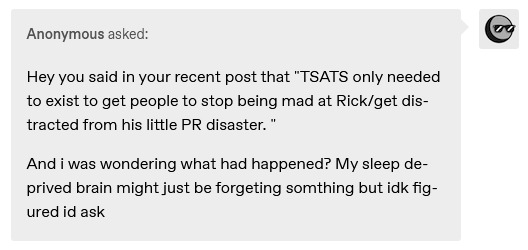
Of course! This was awhile ago so it figures people don't remember it/aren't familiar:
Basically a couple years back (2020) the fandom had some posts circulate discussing the ways different characters in the Riordanverse were written poorly or offensively. There was a masterpost that went around tumblr but the two major points people were particularly focusing on were Piper and Samirah (particularly because Piper had featured prominently again in Trials of Apollo recently and the third MCGA book had further emphasized and discussed Samirah being Muslim, since it was supposed to take place during Ramadan). Basically each had multiple posts breaking down the ways they were depicted incorrectly or offensively. The entire fandom for a little bit was VERY intensely discussing this (and it's around this time the "RR crit" tag got very popularized on tumblr - it did exist before, but suddenly was being used VERY frequently - cause it was that wide-spread - though the discussion took over basically every side of Riordaverse social media on different platforms). People really wanted Rick to respond to these criticisms, so he did!
He made two blog posts, one about Piper and one about Samirah. He has since deleted both so the links are to archived versions. The short version: he essentially tried to justify his poor research and double-down that he hadn't written them offensively, actually, people were just being mean to him. The fandom, of course, reacted poorly to this.
[Further elaborated events under the cut since this got a bit lengthy]
(Fun fact, this all happened within a month or so of the time i posted an open letter on aphobic tropes in the Riordanverse that Rick replied to, and then he immediately followed with announcing that Reyna was intended to be ace-coded [which cause a LOT of fandom debate] before Rick dipped for a couple of weeks, and then came back to post the blog posts in response to Piper and Sam stuff. So I like to jokingly refer to this as "The time I imploded the fandom/drove Rick off of twitter." Twas I that set the house ablaze.)
Rick fully left social media after this and the LT Musical social media manager became Rick's social media manager for the time being.
So this all happened June/July of 2020. Tower of Nero would end up being published in October of 2020 and a few months after that Rick would state that he was done with the series and wouldn't be writing any more series installments involving Percy, and also that he wouldn't be writing a Nico quest following Tower of Nero as it "wasn't his place to" and encouraged the community to write their own versions of Nico's story.
The community continued to circulate the tumblr posts and discuss the topics of Rick's offensive character depictions, and this is also where we see the dramatic shift in how the fandom depicts Piper in fanwork (though in most cases it is admittedly not an improvement 😬) because of all this discussion. This is also around the time when the fandom brought Viria under scrutiny claiming that she was whitewashing Piper as part of the same discussions, through the justification that she was drawing Annabeth as having tan skin (which she does canonically), and if Annabeth has tanner skin then Piper then that's whitewashing Piper? Except they were using completely separate images of not fully rendered Piper art versus Annabeth in dramatic lighting, so it's all very awkward and poor logic, and did actually get kind of racist. A lot of people were calling it "Tannabeth Blackchase" (yeah, i know) or similar and a common sentiment you'd see repeated is "Don't draw Annabeth as having darker skin than Piper, because that's offensive/racist/whitewashing." (Note: it was not phrased "don't draw Piper as having lighter skin than Annabeth" - we also won't get into certain offensive depictions of Native Americans, but I digress). But yeah, the Annabeth stuff in all that did not age well at all.
Anyways, in October of 2021 however Rick would announce that he was co-writing The Sun And The Star - with a lot of heavy emphasis on how Mark Oshiro works as a sensitivity reader, and some false advertising from the official social media that Mark Oshiro was the first time a non-Riordan author would be collaborating on the series (disregarding the ghostwriters completely). One of the big criticisms in the breaking down of issues in Rick's writing was his lack of ever seeking a sensitivity reader, and fans claiming that a sensitivity reader could solve a lot of the problems. This was basically Rick's "look! I totally listened!!!!" (though it did little to actually improve things, based on the book) and in TSATS as well Piper gets a large cameo at the end where the text very directly addresses a lot of points made in criticism of Rick's writing of her.
We also then of course got the CoTG trilogy later, explicitly stated to be for advertising purposes for the show.
So basically, short version: Rick came under scrutiny for a lot of offensive writing within the span of two months, made some bad blog posts doubling down about it, left social media. TOA ends. Rick says he wasn't going to continue the series/write what would become TSATS. Community celebrates the end of of the franchise but also continues to discuss Rick's poor writing and the blog posts at length. Rick suddenly announces TSATS and Mark Oshiro's involvement. Everybody gets distracted from being mad. Show announcement stuff also happens and the discussions peter out.
#pjo#riordanverse#fandom history#rick riordan#rr crit#ask#boywithskull#anonymous#long post //#fun times fun times#im always amused by the bit where i come in. like oh yeah i played a major part in the middle of all of this#i didnt mean to but i was the beginning of the end#maybe thats why this book is my personal hell. its in direct retribution#its really weird though because Rick did not usually reply to people on twitter but he responded to my open letter WITHIN HALF AN HOUR#within half an hour of me posting it he replied and then rapid-fire replied to like two or three other random tweet questions#at which point he confirmed he wrote Reyna with her being alloromantic ace-coded in mind (''but you dont have to agree'')#(i should note also - rick's reply plus the ensuing tweets HEAVILY implies he did NOT actually read my open letter. lmao.)#dipped off twitter for a couple of weeks. came back to post his blog posts responding to criticism about Piper and Sam#and then left social media completely. people kept talking. oh look new book pspspsp. look show pspspsp.#but so. yknow. i did that. it was ME!!!!!! and i will never let him forget. i know what he did.#i will never let him live down shitty PR move to try and sweep those bad blog posts under the rug
188 notes
·
View notes
Text
Double Indemnity, Veritas Ratio and Aventurine

This was originally a part of my compilation post as a short analysis on the Double Indemnity references, linking to this great thread by Manya on Twitter. However, I've recently watched the movie and found that the parallels run much deeper than just the mission name and the light cone itself, plus as the short synopsis I've read online. Since there isn't really an in-depth attempt at an analysis on the film in relation to the way Aventurine and Ratio present themselves throughout Penacony, I thought I'd take a stab at doing just that. I will also be bringing up things from Manya's thread as well as another thread that has some extra points.
Disclaimer that I... don't do analyses very often. Or write, in general — I'm someone who likes to illustrate their thoughts (in the artistic sense) more than write. There's just something about these two that makes me want to rip into them so badly, so here we are. If there's anything you'd like to add or correct me on, feel free to let me know in the replies or reblogs, or asks. This ended up being a rather extensive deep dive into the movie and its influences on the pairing, so please keep that in mind when pressing Read More.
There are two distinct layers on display in Ratio and Aventurine's relationship throughout Penacony, which are references to the two most important relationships in the movie — where they act like they hate/don’t know each other, and where they trust each other.
SPOILER WARNING for the entire movie, by the way. You can watch the film for free here on archive.org, as well as follow along with the screenplay here. I will also be taking dialogue and such from the screenplay, and cite quotes from the original novel in its own dedicated section. SPOILER WARNING for the Cat Among Pigeons Trailblaze mission, as well.

CONTENT WARNING FOR MENTIONS OF SUICIDE. YOU HAVE BEEN WARNED.
To start, Double Indemnity (1944) is a film noir by Billy Wilder (and co-written by Raymond Chandler) based on the novel of the same name by James M. Cain (1927). There are stark differences between the movie adaptation and the original novel which I will get into later on in this post, albeit in a smaller section, as this analysis is mainly focused on the movie adaptation. I will talk about the basics (summaries for the movie and the game, specifically the Penacony mission in tandem with Ratio and Aventurine) before diving into the character and scene parallels, among other things.

—
[THE NAME]
The term "double indemnity" is a clause in which if there’s a case of accidental death of a statistically rare variety, the insurance company has to pay out multiple of the original amount. This excludes deaths by murder, suicide, gross negligence, and natural causes.

The part of the mission in Cat Among Pigeons where Ratio and Aventurine meet with Sunday is named after the movie. And before we get further into things, let's get this part out of the way: The Chinese name used in the mission is the CN title of the movie, so there's no liberties taken with the localization — this makes it clear that it’s a nod to the movie and not localization doing its own thing like with the mission name for Heaven Is A Place On Earth (EN) / This Side of Paradise (人间天堂) (CN).

—
[SUMMARY OF THE 1944 MOVIE]
Here I summarised the important parts that will eventually be relevant in the analysis related to the game.

Insurance salesman Walter Neff, wounded from a gunshot, enters his office and confesses his crime on a dictaphone to his boss Barton Keyes, the claims manager. Much earlier, he had met Phyllis Dietrichson, the wife of Mr. Dietrichson and former nurse. Neff had initially wanted to meet Mr. Dietrichson because of car insurance. Phyllis claims her husband is mean to her and that his life insurance goes to his daughter Lola. With Neff seduced by Phyllis, they eventually brew up a scheme to murder Mr. Dietrichson in such a way that they activate the "double indemnity" clause, and the plan goes off almost perfectly. Initially, the death is labeled a suicide by the president of the company, Norton.
Keyes finds the whole situation suspicious, and starts to suspect Phyllis may have had an accomplice. The label on the death goes from accidental, to suicide, to then murder. When it’s ruled that the husband had no idea of the accidental policy, the company refuses to pay. Neff befriends Phyllis’ stepdaughter Lola, and after finding out Phyllis may have played a part in the death of her father’s previous wife, Neff begins to fear for Lola and himself, as the life insurance would go all towards her, not Phyllis.
After the plan begins to unravel as a witness is found, it comes out that Lola’s boyfriend Nino Zachette has been visiting Phyllis every night after the murder. Neff goes to confront Phyllis, intending to kill her. Phyllis has her own plans, and ends up shooting him, but is unable to fire any more shots once she realises she did love him. Neff kills her in two shots. Soon after telling Zachette not to go inside the house, Neff drives to his office to record the confession. When Keyes arrives, Neff tells him he will go to Mexico, but he collapses before he could get out of the building.
—
[THE PENACONY MISSION TIMELINE]

I won’t be summarising the entirety of Aventurine and Ratio’s endeavours from the beginning of their relationship to their final conversation in Heaven Is A Place On Earth the same way as I summarised the plot of the movie, so I will instead present a timeline. Bolded parts means they are important and have clear parallels, and texts that are in [brackets] and italics stand for the names of either the light cone, or the mission names.
[Final Victor] Their first meeting. Ratio’s ideals are turned on its head as he finally meets his match.
Several missions happen in-between their first encounter and the Penacony project. They come to grow so close and trusting with each other that they can guess, understand each other’s thoughts, way of thinking and minds even in high stakes missions. Enough to pull off the Prisoner’s Dilemma (Aventurine’s E1) and Stag Hunt Game (Aventurine’s E6) and come out on top.
Aventurine turns towards Ratio for assisting him in the Penacony project. Ratio's involvement in the project is implied to be done without the knowledge of Jade, Topaz, and the IPC in general, as he was only sent to Penacony to represent the Intelligentsia Guild, and the two other Stonehearts never mention Ratio.
Aventurine and Ratio cook up the plan to deceive Sunday before ever setting foot on Penacony. Aventurine does not tell Ratio the entirety of his plan.
Aventurine convinces Topaz and Jade to trust him with their Cornerstones. Aventurine also breaks his own Cornerstone and hides it along with the jade within a bag of gift money.
[The Youth Who Chase Dreams] They enter Penacony in the Reverie Hotel. Aventurine is taken to the side by Sunday and has all his valuables taken, which includes the gift money that contains the broken aventurine stone, the jade, and the case containing the topaz.
Aventurine and Ratio speak in a “private” room about how Aventurine messed up the plan. After faking an argument to the all-seeing eyes of Sunday, Ratio leaves in a huff.
Ratio, wearing his alabaster head, is seen around Golden Hour in the (Dusk) Auction House by March 7th.
[Double Indemnity] Ratio meets up with Sunday and “exposes” Aventurine to him. Sunday buys his “betrayal”, and is now in possession of the topaz and jade. Note that this is in truth Ratio betraying Sunday all along.
Ratio meets up with Aventurine again at the bar. Ratio tells Aventurine Sunday wants to see him again.
They go to Dewlight Pavilion and solve a bunch of puzzles to prove their worth to Sunday.
They meet up with Sunday. Sunday forces Aventurine to tell the truth using his Harmony powers. Ratio cannot watch on. It ends with Aventurine taking the gift money with his Cornerstone.
[Heaven Is A Place On Earth] They are in Golden Hour. Ratio tries to pry Aventurine about his plan, but Aventurine reins him in to stop breaking character. Ratio gives him the Mundanite’s Insight before leaving. This is their final conversation before Aventurine’s grandest death.
Now how exactly does the word “double indemnity” relate to their mission in-game? What is their payout? For the IPC, this would be Penacony itself — Aventurine, as the IPC ambassador, handing in the Jade Cornerstone as well as orchestrating a huge show for everybody to witness his death, means the IPC have a reason to reclaim the former prison frontier. As for Ratio, his payout would be information on Penacony’s Stellaron, although whether or not this was actually something he sought out is debatable. And Aventurine? It’s highly implied that he seeks an audience with Diamond, and breaking the Aventurine Cornerstone is a one way trip to getting into hot water with Diamond. With Aventurine’s self-destructive behaviour, however, it would also make sense to say that death would be his potential payout, had he taken that path in the realm of IX.
Compared to the movie, the timeline happens in reverse and opposite in some aspects. I will get into it later. As for the intended parallels, these are pretty clear and cut:
Veritas Ratio - Walter Neff
Aventurine - Phyllis Dietrichson
Sunday - Mr. Dietrichson

There is one other character who I feel also is represented in Ratio, but I won’t bring them up until later down the line.
For the sake of this analysis, I won’t be exploring Sunday’s parallel to Mr. Dietrichson, as there isn’t much on Dietrichson’s character in the first place in both the movie and the novel. He just kind of exists to be a bastard that is killed off at the halfway point. Plus, the analysis is specifically hyper focused on the other two.
—
[SO, WHAT’S THE PLAN?]
To make things less confusing in the long run whenever I mention the words “scheme” and “plan”, I will be going through the details of Phyllis and Neff’s scheme, and Aventurine and Ratio’s plan respectively. Anything that happens after either pair separate from another isn’t going to be included. Written in a way for the plans to have gone perfectly with no outside problems.

Phyllis and Neff —> Mr. Dietrichson
Goal: Activate the double indemnity clause by killing Mr. Dietrichson and making it look like a freak train accident
Payout: Twice or more of the face value of the life insurance ($100,000)
Main Actor: Walter Neff | Accomplice: Phyllis Dietrichson
During the entire time until the payout, Phyllis and Neff have to make sure to any outsiders that they look like complete strangers instead of lovers in an affair.
Step-by-step:
Neff convinces Mr. Dietrichson to sign the policy with the clause without him suspecting foul play, preferably with a third party to act as an alibi. This is done discreetly, making Mr. Dietrichson not read the policy closely and being told to just sign.
Neff and Phyllis talk to each other about small details through the phone (specified to be never at Phyllis’ own house and never when Neff was in his office) and in the marketplace only, to make their meetings look accidental. They shouldn’t be seen nor tracked together, after all.
Phyllis asks Mr. Dietrichson to take the train. She will be the one driving him to the train station.
On the night of the murder, after making sure his alibi is airtight, Neff sneaks into their residence and hides in their car in the second row seating, behind the front row passenger seat. He wears the same colour of clothes as Mr. Dietrichson.
Phyllis and Mr. Dietrichson get inside the car — Phyllis in the driver’s seat and Mr. Dietrichson in the passenger seat. Phyllis drives. On the way to the train station, she makes a detour into an alley. She honks the horn three times.
After the third honk, Neff breaks Mr. Dietrichson’s neck. The body is then hidden in the second row seating under a rug.
They drive to the train station. Phyllis helps Neff, now posing as Mr. Dietrichson, onto the train. The train leaves the station.
Neff makes it to the observation platform of the parlour car and drops onto the train tracks when nobody else is there.
Phyllis is at the dump beside the tracks. She makes the car blink twice as a signal.
The two drag Mr. Dietrichson’s corpse onto the tracks.
They leave.
When Phyllis eventually gets questioned by the insurance company, she pretends she has no idea what they are talking about and eventually storms off.
Phyllis and Neff continue to lay low until the insurance company pays out.
Profit!
Actual Result: The actual murder plan goes almost smoothly, with a bonus of Mr. Dietrichson having broken a leg. But with him not filing a claim for the broken leg, a witness at the observation platform, and Zachette visiting Phyllis every night after the murder, Keyes works out the murder scheme on his own, but pins the blame on Phyllis and Zachette, not Neff.

Now for Aventurine and Ratio. You can skip this section if you understand how deep their act goes, but to those who need a refresher, here’s a thorough explanation:
Aventurine and Ratio —> Sunday
Goal: Collect the aventurine stone without Sunday knowing, ruin the dream (and create the grandest death)
Payout: Penacony for the IPC, information on the Stellaron for Ratio, a meeting with Diamond / death for Aventurine
Main Actor: Aventurine | Accomplice: Veritas Ratio
From the moment they step onto Penacony, they are under Sunday’s ever present and watchful eyes. “Privacy” is a foreign word to The Family. They have to act like they don’t like each other’s company the entire time and feed Sunday information through indirect means so that the eventual “betrayal” by Ratio seems truthful to Sunday. Despite what it looks like, they are closer than one would ever think, and Ratio would never sell out a person purely for information.
Step-by-step:
After Sunday takes away the bag of gift money and box, Aventurine and Ratio talk in a room in the Reverie Hotel.
Aventurine establishes the Cornerstones’ importance, and how he lost the gift money and the case containing the Cornerstones to Sunday. Ratio turns to leave, saying “some idiot ruined everything”, meaning the Cornerstones were vital to their plan. (Note that Ratio is not wearing his alabaster head while saying it to said “idiot”.)
Aventurine then proceeds to downplay the importance of the Cornerstones, stating they are “nothing more than a few rocks” and “who cares if they are gone”. This lets Sunday know that something suspicious may be going on for him to act like it’s nothing, and the mention of multiple stones, and leaves him to look up what a Cornerstone is to the Ten Stonehearts of the IPC.
Ratio points out his absurd choice of outfit, mentioning the Attini Peacock and their song.
Ratio implies that without the aventurine stone, he is useless to the IPC. He also establishes that Aventurine is from Sigonia(-IV), and points out the mark on his neck. To Sunday, this means that Aventurine is shackled to the IPC, and how Aventurine may possibly go through extreme lengths to get the stone back, because a death sentence always looms above him.
Aventurine claims Ratio had done his homework on his background, which can be taken that this is their very first time working together. (It isn’t, and it only takes one look to know that Aventurine is an Avgin because of his unique eyes, so this comment does not make sense even in a “sincere” way, a running theme for the interaction.)
Ratio mentions how the true goal is to reclaim Penacony for the IPC, establishing their ulterior motive for attending the banquet.
Ratio asks if Aventurine went to pre-school in Sigonia after saying trust was reliant on cooperation. Aventurine mentions how he didn’t go to school and how he doesn’t have any parents. He even brings up how friends are weapons of the Avgins. This tells Sunday that the Avgins supposedly are good at manipulation and potentially sees Ratio possibly betraying Aventurine due to his carelessness with his “friends”. Sunday would also then research about the Avgins in general (and research about Sigonia-IV comes straight from the Intelligentsia Guild.)
Ratio goes to Dewlight Pavilion in Sunday’s Mansion and exposes a part of Aventurine’s “plan”. When being handed the suitcase, Ratio opens it up due to his apparent high status in the IPC. He tells Sunday that the Cornerstone in the suitcase is a topaz, not an aventurine, and that the real aventurine stone is in the bag of gift money. This is a double betrayal — on Aventurine (who knows) and Sunday (who doesn’t). Note that while Ratio is not officially an IPC member in name — the Intelligentsia Guild (which is run by the IPC head of the Technology Department Yabuli) frequently collaborates with the IPC. Either Aventurine had given him access to the box, or Ratio’s status in general is ambiguous enough for Sunday not to question him further. He then explains parts of Aventurine’s gamble to Sunday in order to sell the betrayal. Note that Ratio does not ever mention Aventurine’s race to Sunday.
Ratio brings Aventurine to Sunday. Aventurine offers help in the investigation of Robin's death, requesting the gift money and the box in return.
Sunday objects to the trade offer. Aventurine then asks for just the bag. A classic car insurance sales tactic. Sunday then interrogates Aventurine, and uses everything Ratio and Aventurine brought up in the Reverie Hotel conversation and their interactions in the Mansion, as well as aspects that Ratio had brought up to Sunday himself.
Aventurine feigns defeat and ignorance enough so that Sunday willingly lets him go with the gift bag. After all is said and done, Aventurine leaves with the gift money, where the Aventurine Cornerstone is stored all along.
Ratio and Aventurine continue to pretend they dislike each other until they go their separate ways for their respective goals and plans. Aventurine would go on to orchestrate his own demise at the hands of Acheron, and Ratio… lurks in the shadows like the owl he is.
Profit!
Actual Result: The plan goes perfectly, even with minor hiccups like Ratio coming close to breaking character several times and Aventurine being sentenced to execution by Sunday.
This is how Sunday uses the information he gathered against Aventurine:
• Sunday going on a tirade about the way Aventurine dresses and how he’s not one to take risks — Ratio’s comment about Aventurine’s outfit being peacock-esque and how he’s “short of a feather or two”. • “Do you own a Cornerstone?” — Ratio talked about the aventurine stone. • “Did you hand over the Cornerstone to The Family when you entered Penacony?” — Aventurine mentioned the box containing the Cornerstones. • “Does the Cornerstone you handed over to The Family belong to you?” — Aventurine specifically pluralized the word Cornerstone and “a bunch of rocks” when talking to Ratio. • “Is your Cornerstone in this room right now?” — The box in the room supposedly contained Aventurine’s own cornerstone, when Aventurine mentioned multiple stones. • “Are you an Avgin from Sigonia?” —Aventurine mentioned that he’s an Avgin, and Ratio brought up Sigonia. • “Do the Avgins have any ability to read, control, and manipulate one’s own or another’s minds?” — Aventurine’s comment on how friends are weapons, as well as Sunday’s own research on the Avgins, leading him to find out about the negative stereotypes associated with them. • “Do you love your family more than yourself?” — His lost parents. “All the Avgins were killed in a massacre. Am I right?” — Based on Sunday’s research into his background. • “Are you your clan’s sole survivor?” — Same as the last point. “Do you hate and wish to destroy this world with your own hands?” — Ratio mentioned the IPC’s goal to regain Penacony, and Aventurine’s whole shtick is “all or nothing”. • “Can you swear that at this very moment, the aventurine stone is safe and sound in this box?” — Repeat.
As seen here, both duos have convoluted plans that involve the deception of one or more parties while also pretending that the relationship between each other isn’t as close as in reality. Unless you knew both of them personally and their histories, there was no way you could tell that they have something else going on.
On to the next point: Comparing Aventurine and Ratio with Phyllis and Neff.
—
[NEFF & PHYLLIS — RATIO & AVENTURINE]

With the short summaries of the movie and the mission out of the way, let’s look at Phyllis and Neff as characters and how Aventurine and Ratio are similar or opposite to them.

Starting off with Aventurine and Phyllis. Here is where they are the most similar:
Phyllis is blonde and described as a provocative woman. Aventurine is also a blond and eyes Ratio provocatively in the Final Victor light cone.
Phyllis was put under surveillance after Keyes starts figuring out that the so-called accidental death/suicide may have been a murder after all. Similarly, Aventurine was watched by Sunday the entire time in Penacony.
Phyllis never tells Neff how she's seeing another man on the side to possibly kill him too (as well as how she was responsible for the death of her husband‘s previous wife). Aventurine also didn't tell Ratio the entirety of his plan of his own death.
Phyllis puts on a somewhat helpless act at first but is incredibly capable of making things go her way, having everything seemingly wrapped around her finger. Aventurine — even when putting on a facade that masks his true motives — always comes out at the top.
Now the differences between Aventurine and Phyllis:
Phyllis does not care about her family and has no issue with killing her husband, his previous wife, and possibly her daughter Lola. Opposite of that, Aventurine is a family man… with no family left, as well as feeling an insane level of survivor’s guilt.
Really, Phyllis just… does not care at all about anyone but herself and the money. Aventurine, while he uses every trick in the book to get out on top, does care about the way Jade and Topaz had entrusted him with their Cornerstones, in spite of the stones being worth their lives.
Phyllis also uses other people to her advantage to get what she wants, often behind other people's backs, with the way she treats Neff and Zachette. Aventurine does as well (what with him making deals with the Trailblazer while also making a deal with Black Swan that involves the Trailblazer). The difference here is Phyllis uses her allure deliberately to seduce men while Aventurine simply uses others as pawns while also allowing others to do the same to himself.
Phyllis makes no attempt at compromising the policy when questioned by Norton. Aventurine ends up compromising by only taking the gift money (which is exactly what he needs).
The wig that Barbara Stanwyck (the actress of Phyllis) wore was chosen to make her look as “sleazy” as possible, make her look insincere and a fraud, a manipulator. A sort of cheapness. Aventurine’s flashy peacock-esque outfit can be sort of seen as something similar, except the outfit isn’t cheap.

Moving on to Ratio’s similarities to Neff… There isn’t much to extrapolate here as Ratio is more of a side character in the grand scheme of Penacony, however this is what I’ve figured out.
Neff has dark hair. Ratio has dark purple hair.
Neff almost never refers to Phyllis by her name when speaking with her, only as “baby”. The few times he refers to her as Phyllis or Mrs. Dietrichson is during their first conversations and when he has to act like he doesn’t know her. Ratio never calls Aventurine by his name when he’s around him — only as “gambler”, sometimes “damned” or “dear” (EN-only) gambler. Only in the Aventurine's Keeping Up With Star Rail episode does Ratio repeatedly say his name, and yet he still calls him by monikers like “gambler” or, bafflingly, a “system of chaos devoid of logic”.
Both Neff and Ratio committed two betrayals: Neff on Mr. Dietrichson and Keyes, and Ratio on Sunday and Aventurine. With the former cases it was to reach the end of the trolley line, and with the latter it was on a man who had put his trust in him.
As for the differences…
Neff is described as someone who’s not smart by his peers. Ratio is someone who is repeatedly idolised and put on a pedestal by other people.
Neff is excellent at pretending to not know nor care for Phyllis whenever he speaks about her with Keyes or when he and she are in a place that could land them in hot water (the office, the mansion when there are witnesses). His acting is on the same level as Phyllis. With Ratio it’s… complicated. While he does pull off the hater act well, he straight up isn’t great at pretending not to care about Aventurine’s wellbeing.
Instead of getting his gunshot wound treated in the hospital like a normal person, Neff makes the absolutely brilliant decision of driving to his office and talking to a dictaphone for hours. Needless to say, this is something a medical doctor like Ratio would never do.

Now here's the thing. Though it's very easy to just look at Phyllis and Neff in the movie and go "okay, Aventurine is Phyllis and Ratio is Neff — end of story" and leave it at that, I find that they both take from the two leads in different ways. Let me explain. Beginning with Aventurine and Neff…
Neff is the one who hatches the plan and encourages Phyllis to go through and claim the double indemnity clause in the first place. He is also the key player of his own risky plan, having to fake being the husband to enter the train as well as fake the death. Aventurine puts himself at great risk just by being in Sunday’s presence, and hoping that Sunday wouldn’t figure out that the green stone he had uncovered wasn’t the aventurine stone.
Adding onto the last point, Neff had fantasised about pulling off the perfect murder for a long time — the catalyst was simply him meeting Phyllis. Aventurine presumably sought out Ratio alone for his plan against Sunday.
Neff makes a roulette wheel analogy and talks about a pile of blue and yellow poker chips (the latter in the script only). I don‘t even have to explain why this is relevant here. (Aventurine’s Ultimate features a roulette wheel and the motif is on his belt, thigh strap, and back, too. And of course, Aventurine is all about his chips.)
Neff has certain ways to hide when he’s nervous, which include hiding his hands in his pockets when they were shaking, putting on glasses so people couldn’t see his eyes. Aventurine hides his left hand behind his back when he’s nervous: Future Aventurine says that "they don't know the other hand is below the table, clutching [his] chips for dear life", and in multiple occasions such as the Final Victor LC, his character trailer, and even in his boss form in the overworld you can see that Aventurine hides his left hand behind his back. And he is also seen with his glasses on sometimes.
Neff says a bunch of stuff to make sure that Phyllis acts her part and does not act out of character (i.e. during their interactions at the market), like how Aventurine repeatedly tries to get Ratio back on track from his subpar acting.
Neff is always one step ahead of the game, and the only reason the plan blows up in his face is due to outside forces that he could not have foreseen (a witness, Keyes figuring out the plan, the broken leg). Aventurine meanwhile plays 5D chess and even with the odds against him, he uses everything he can to come out on the top (i. e. getting Acheron to kill him in the dream).
Even after coming home on the night of the murder, Neff still felt that everything could have gone wrong. Aventurine, with his blessed luck, occasionally wavers and fears everything could go wrong whenever he takes a gamble.
Neff was not put under surveillance by Keyes due to him being extensive with his alibi. After witnessing Robin’s death with eyewitnesses at the scene, the Family had accepted Aventurine’s alibi, though he would be under watch from the Bloodhounds according to Ratio.
Neff talks about the entire murder scheme to the dictaphone. Aventurine during Cat Among Pigeons also retells his plan, albeit in a more convoluted manner, what with his future self and all.

Continuing with Ratio and Phyllis, even with their personalities and motivations being quite different, they do have a few commonalities.
Phyllis was a nurse. Ratio is a medical doctor.
Her name is Greek of origin. Veritas Ratio, though his name is Latin, has Greco-Roman influences throughout his entire character.
The very first scene Phyllis appears in has her wearing a bath towel around her torso. Ratio loves to take baths to clear his mind.
Phyllis was instructed by Neff to be at the market every morning at eleven buying things. Ratio is seen in an auction house with his alabaster head on so no one could recognize him.
Phyllis mostly acts as an accomplice to the scheme, being the one to convince her husband to take the train instead. She is also generally seen only when Neff is involved. Ratio plays the same role as well, only really appearing in the story in relation to Aventurine as well as being the accomplice in Aventurine’s own death. Even him standing in the auction house randomly can be explained by the theory that he and Aventurine had attempted to destabilise Penacony’s economy through a pump and dump scheme.
With these pointers out of the way, let’s take a closer look at select scenes from the film and their relation to the mission and the pair.
—
[THE PHONE CALL — THE REVERIE HOTEL]

Before the murder, there is a scene with a phone call between Phyllis and Neff discussing the plan while Keyes is in the same room as Neff. Neff has to make sure that Keyes doesn’t think of anything of the phone call, so he acts like he’s calling a “Margie”, and says a bunch of stuff that sounds innocent out of context (“Can’t I call you back, ‘Margie’?” “What color did you pick out?” “Navy blue. I like that fine”), but are actually hinting at the real plan all along (the suit that Mr. Dietrichson wears.)
In a roundabout way, the conversation between Ratio and Aventurine in the Reverie Hotel can be seen as the opposite of that scene — with the two talking about their supposed plan out loud on Penacony ground, a place where the Family (and in turn, Sunday) has eyes everywhere. Despite being in a “private” room, they still act like they hate each other while airing out details that really do not make sense to air out if they really did meet the first time in Penacony (which they didn’t — they’ve been on several missions beforehand). It’s almost like they want a secret third person to know what they were doing, instead of trying to be hushed up about it. The TVs in the room that Sunday can look through based on Inherently Unjust Destiny — A Moment Among The Stars, the Bloodhound statue that disappears upon being inspected, the owl clock on the left which side eyes Ratio and Aventurine, all point to that Sunday is watching their every move, listening to every word.
Rewinding back to before the phone call, in one of the encounters at the marketplace where they “accidentally” run into each other, Phyllis talks about how the trip was off. How her husband wouldn’t get on the train, which was vital for their plan, because of a broken leg. All this, while pretending to be strangers by the passersby. You could say that the part where Ratio almost leaves because Aventurine had “ruined the plan” is the opposite of this, as the husband breaking his leg was something they couldn’t account for, while Aventurine “being short of a few feathers” was entirely part of the plan.
—
[QUESTIONING PHYLLIS — THE INTERROGATION]

This section is going to be a little longer as I will cover two scenes in the movie in a more detailed manner — Mr. Dietrichson signing the policy, and Phyllis being questioned — and how they are represented in the Sunday-Aventurine interrogation and the prior conversation between Ratio and Sunday in multitudes of ways.
Going about their plan, Neff has to make sure that Mr. Dietrichson signs the policy with the double indemnity clause without him knowing the details, all the while having Phyllis (and Lola) in the same room. He and Phyllis have to pretend that they don’t know each other, and that this is just the standard accidental insurance process, instead of signing what would be his downfall. To sell it, he gets Mr. Dietrichson to sign two “copies” of the form, except with Mr. Dietrichson’s second signature, he’s duped into signing the accident insurance policy with the respective clause.
You can tie this to how Ratio goes to Sunday in order to “expose” the lie that the suitcase didn’t actually contain the Aventurine Cornerstone, as well as there being more than one Cornerstone involved in the scheme. Ratio must make sure that Sunday truly believes that he dislikes Aventurine’s company, while also making sure that Sunday doesn’t figure out the actual aventurine stone is broken and hidden in the gift bag. The scheme turns out to be successful, as Sunday retrieves the two Cornerstones, but not the aventurine stone, and truly does think that the green stone he has in his possession is the aventurine.

This whole scene with Sunday is also reminiscent of the interrogation scene in the middle of the movie, where Phyllis was questioned by the boss (Norton) who was deducing that Mr. Dietrichson's death was a suicide, not accidental death. Neff, Phyllis, Keyes and Norton were all in the same room, and Neff and Phyllis had to act like they never knew the other. Phyllis acts like she knows nothing about what Norton insinuates about her husband and eventually, Phyllis explodes in anger and storms out the room, even slamming the door. Her act is very believable to any outsider.

Now back to the Ratio and Sunday conversation. One glaring difference between the movie and here is that his acting isn’t great compared to either Phyllis nor Neff. It never was throughout the Penacony mission. He even comes very close to breaking character several times, and is even defending Aventurine in a somewhat aggressive manner during his one-on-one conversation with Sunday, as in he literally tells Sunday to see a shrink. It’s very different from the way he was acting in Herta Space Station — like Ratio cares about Aventurine too much to keep his hands off.
It's also worth pointing out that Neff doesn't speak a word when Phyllis was being interrogated. Similarly, Ratio is silent throughout the entire scene with Sunday and Aventurine, with his only “line” being a “hm”. When Aventurine calls him a wretch to his face, all he does is look to the side. In fact, he can only look at Aventurine when the other isn’t staring back. Almost like him uttering a single word would give them away. Or his acting is terrible when it has to do with Aventurine, as he has no issue doing the same thing in Crown of the Mundane and Divine (Mundane Troubles).
So, Sunday finds out about the Cornerstones and reveals them to Aventurine, and reasons that he cannot give them back to him because Aventurine had lied. Note that in that same scene, Aventurine attempted to use the two murders that had occurred beforehand against Sunday to retrieve his own cornerstone. Similarly, when it was revealed that Mr. Dietrichson did not know about the accident policy and that the so-called “accidental death” was not, in fact, accidental, the insurance company refused to pay out the money.
Unlike the movie, this was all planned, however. The double-crossing by Ratio, the gift money being the only thing required for Aventurine’s real plan. All of it was an act of betrayal against Sunday, in the same manner as the meticulous planning as Mr. Dietrichson’s murder — To sign the policy, get him to take the train, kill him on the way, and to have Neff pose as the husband on the train until the time is right to get off and lay the body on the tracks. A key difference is that they could not have expected their scheme to be busted wide open due to forces outside of their control, while Ratio and Aventurine went straight down the line for the both of them no matter what.
From here on out, we can conclude that the way Ratio and Aventurine present themselves in Penacony to onlookers is in line with Neff and Phyllis.
—
[“GOODBYE, BABY” — FINAL VICTOR]

And now for the (in)famous light cone, Final Victor. The thing that truly kickstarted the Ratio and Aventurine ship in the fanbase, and the partnership between the two in general. It’s a direct reference to the final confrontation between Neff and Phyllis in the movie.
I’ll fire through all the similarities between the two scenes.
During the respective scenes, Aventurine and Phyllis both outsmart their partner one way or the other: Aventurine with his one-sided game of Russian Roulette, and Phyllis hiding her gun underneath the cushions until Neff turned away.
The guns are owned by Phyllis and Aventurine, not Neff and Ratio.
Phyllis couldn’t bring herself to fire any more shots after she realised she truly did love Neff. Ratio could do nothing but watch as Aventurine did what he did — he couldn’t even pull away if the LC animation is anything to go by him struggling as Aventurine firmly keeps the gun to his chest.
Neff says he doesn’t buy (believe) that Phyllis loved him. She then goes “I’m not asking you to buy […]”. The LC description has Aventurine ask Ratio “You don’t believe me?”, while in the LC animation Ratio straight up says “You expect me to believe you?” and Aventurine answering “Why not, doctor/professor?”
The visual composition of the LC and the scene are nearly identical, from the lighting to the posing to the way Aventurine looks at Ratio — Aventurine and Ratio are even wearing different outfits to fit the scene better. The background in the LC is also like the blinders in the movie, just horizontal.
In the shot where Phyllis’ face is more visible, the way she looks at Neff is strikingly like the way provocatively looks at Ratio. Even their eyes have a visible shine — Phyllis’ eyes brightly shining the moment she realised she really fell in love with Neff, and Aventurine having just a little light return to his eyes in that specific moment.
And now the differences!
Neff holds the gun in his right hand. Aventurine makes Ratio hold his gun in his left.
Neff is the one who takes the gun from Phyllis‘ hand. Aventurine is the one who places the gun in Ratio’s hand and fires it.
Three gunshots are fired. In the movie, Phyllis shoots the first shot and Neff the second and third. Aventurine unloads the gun and leaves only one bullet for this game of Russian Roulette. He pulls the trigger three times, but they all turn out to be blanks.
Phyllis does not break her façade of not smiling until the very last moment where she gets shot. Aventurine is smiling the entire time according to the light cone description, whilst in the animation, it’s only when he guides the gun to his chest that he puts it on.
So, you know how Neff meets Phyllis and it all goes off the rails from there. The way Neff goes from a decent guy to willingly involve himself in a murder scheme, having his morals corrupted by Phyllis. His world having been turned upside down the moment he lays eyes on Phyllis in that first meeting. Doesn’t that sound like something that happened with the Final Victor LC? Ratio, a man all about logic and rationality — a scholar with eight PhDs to his name — all of that is flipped on its head the moment Aventurine pulls out his gun in their first meeting and forces Ratio to play a game of Russian roulette with him. Aventurine casually gambles using his own life like it’s nothing and seemingly without fear (barring his hidden left hand). All or nothing — and yet Aventurine comes out alive after three blanks. Poetic, considering there’s a consumable in the game called “All or Nothing” which features a broken chess piece and a poker chip bound together by a tie. The poker chip obviously represents the gambler, but the chess piece specifically stands for Ratio because he plays chess in his character trailer, his Keeping Up With Star Rail episode and his introduction is centred around him playing chess with himself. Plus, the design of the chess piece has golden accents, similar to his own chess set. In the end, Aventurine will always be the final victor.
Furthermore, Neff had deduced that Phyllis wanted to kill her husband and initially wanted no part in it, but in a subsequent visit it was his own idea that they trigger the double indemnity clause for more money. As the movie progresses though, he starts to have his doubts (thanks in part to him befriending Lola) and makes the move to kill Phyllis when everything starts to come to light. It’s strikingly similar to how Ratio initially wanted no part in whatever Aventurine had in mind when they first met, but in the subsequent missions where they were paired up, he willingly goes along with Aventurine's risky plans, and they come to trust each other. Enough so that Aventurine and Ratio can go to Penacony all on their own and put on an act, knowing that nobody in the IPC other than them can enter the Dreamscape. The mutual respect grew over time, instead of burning passionately before quickly fizzling out like in the movie.
Basically, in one scene, three shots (blanks) start a relationship, and in the other, it ends a relationship. In the anan magazine interview with Aventurine, he says himself that “form[ing] an alliance with just one bullet” with Ratio was one of his personal achievements. The moment itself was so impactful for both parties that it was immortalised and turned into a light cone.
—
[THE ENDING — GOLDEN HOUR]

The ending of Double Indemnity that made it into the final cut has Neff continue his confession on the dictaphone until he realised that he wasn’t alone in the room. Keyes had come inside at some point, but none had said a thing, only listening to a dead man speak of his crime. When Neff sees Keyes, they talk for a moment, Neff says he plans on fleeing to Mexico. Keyes does not think he will make it. He tries to leave, only to collapse at the front of the elevator, Keyes following just behind him. Neff attempts to light a cigar but is too weak to do so, so Keyes does it for him.
Parts of the ending can still be attributed to the interrogation scene between Sunday and Aventurine, so I’ll make this quick before moving on to the conversation in Heaven Is A Place On Earth, Ratio and Aventurine’s final conversation together. Once Sunday mentions how quickly Aventurine gave up the suitcase, he inflicts the Harmony’s consecration on him, which forces Aventurine to confess everything that Sunday asks of. In a way, it’s the opposite of what happens in the movie — where Neff willingly tells the truth about the murder to his coworker. Aventurine does not like Sunday, and Neff is close to Keyes. Ratio also does not speak, similarly to how Keyes didn’t speak and stood silently off to the side.
Post-interrogation in Golden Hour, Ratio worriedly prods at Aventurine and asks him about his plan. He then gives him the Mundanite’s Insight with the Doctor’s Advice inside when Aventurine tells him to leave. Throughout Heaven Is A Place On Earth, Aventurine gets weaker and his head starts to buzz, until he falls to the ground before he can hand in the final gems. Similarly, Neff progressively grows weaker as he records his confession. Keyes says he’s going to call a doctor and Neff says he’s planning to go to Mexico. And when Neff collapses near the elevator, they talk one final time and Keyes lights Neff’s cigar as the other was too weak to do so himself.

—
[OPPOSITE TIMELINES AND DEVELOPMENTS]
Remember how I said the way certain events happen in the movie and the game are mostly opposite and reverse of one another?
The Final Victor LC is the first meeting of Ratio and Aventurine, and Neff killing Phyllis is their final meeting.
Between that first and last meeting between Phyllis and Neff’s whirlwind romance, their relationship becomes strained which ultimately leads to Neff not trusting whatever Phyllis has to say at the end point of the movie. As for Ratio and Aventurine, the exact opposite had happened, to the point where Ratio trusts Aventurine enough to go along with his plans even if they went against his own ideals. The basis of the mission involved Veritas Ratio, whose full name includes the Latin word for “truth”, lying the entire time on Penacony.
Aventurine is sentenced to the gallows by Sunday after his unwilling interrogation. The movie starts and ends with Neff willingly confessing everything to Keyes.
It bears repeating, but I have to make it so clear that the trust between Ratio and Aventurine runs incredibly deep. Being able to predict what your partner says and thinks and plans in a mission as critical as the Penacony project is not something first-time co-workers can pull off flawlessly. All the while having to put on masks that prevent you from speaking sincerely towards one another lest you rat yourselves out. You have no way of contacting outside reinforcements from within Penacony, as the rest of the IPC are barred from entering. To be able to play everybody for fools while said fools believe you yourselves have handed your case on a silver platter requires a lot — trust, knowledge of the other, past experience, and so on. With Phyllis and Neff, the trust they had had been snuffed out when Neff grew closer to Lola and found out what kind of person Phyllis truly was on the inside. Phyllis did not trust nor love Neff enough and was going behind his back to meet with Zachette to possibly take Neff and Lola out. And the whole reason Neff wanted to perpetrate the murder was due to him being initially taken by Phyllis' appearance, which single handedly got the ball rolling on the crime.
Now then, how come trust is one of the defining aspects of Aventurine and Ratio’s relationship, when Phyllis and Neff’s trust eventually lead to both their deaths at the hands of the other? Sure, this can be explained away with the opposite theory, but there’s one other relationship involving Neff which I haven’t brought up in excruciating detail yet. The other side of Ratio and Aventurine’s relationship.
—
[NEFF & KEYES — AVENTURINE & RATIO]

Here is where it gets more interesting — while Phyllis and Neff are at the centre point of the movie, there is another character to whom Neff has a close relationship with — Keyes. It’s also the only relationship with no pretences, at least, until the whole murder thing happened and Neff had to hide his involvement from Keyes. Watching the movie, I couldn't help but feel there was something more to the two than meets the eye. I knew that queer readings of the film existed, but I didn't think too much of them until now. And though Aventurine and Ratio parallel Phyllis and Neff respectively, the fact that they also have traits of their opposite means that it wouldn’t be completely out of the question if parts of their relationship were also influenced by Keyes and Neff on a deeper and personal level. Let me explain.
Keyes and Neff were intimate friends for eleven years and have shown mutual respect and trust towards one another. They understood each other on a level not seen with Phyllis and Neff. Even after hearing Neff confess his crimes through the dictaphone (and eventually standing in the same room while Neff confessed), he still cared for the other man, and stayed with him when Neff collapsed at the front door. The only reason Keyes hadn’t deduced that it was Neff who was behind the murder was because he had his absolute trust in him. Keyes is also Neff’s boss, and they are always seen exchanging playful banter when they are on screen together. Neff even says the words “I love you, too” twice in the movie — first at the beginning and second at the end, as the final line. There’s also the persistent theme of Neff lighting Keyes’ cigarettes (which happens in every scene where they are face-to-face), except in the end where it’s Keyes who lights Neff’s.
Doesn’t that sound familiar? Mutual respect, caring too much about the other person, the immense amount of trust… Ratio says he’s even the manager of the Penacony project (which may or may not be a lie), and despite their banter being laced with them acting as “enemies”, you can tell that in Dewlight Pavilion pre-Sunday confrontation that Aventurine genuinely likes Ratio’s company and believes him to be a reliable person. From the way he acts carefree in his words to the thoughts in his head, as seen in the mission descriptions for Double Indemnity. Their interactions in that specific mission are possibly the closest thing to their normal way of speaking that we get to see on Penacony.

Not to mention, this is the way Neff describes Keyes. He even says (not in the script) “you never fooled me with your song and dance, not for a second.” Apart from the line about the cigar ashes, doesn’t this ring a bell to a certain doctor? “Jerk” with a heart of gold?

After solving the puzzle with the statues, Ratio jokingly offers Aventurine to join the Genius Society. Aventurine then goes "Really? I thought you’ve given up on that already", and then Ratio says it was, in fact, a joke. Solving the puzzle through brute force has Ratio telling Aventurine that the Council of Mundanites (which Ratio himself is a part of) should consider him a member. In the movie, where the scene with the phone call with Neff and Phyllis reiterating details of their plan happens, Keyes actually offered Neff a better job (specifically a desk job, as Keyes’ assistant). The two pairs saw the other as smart, equals, and were invested in each other’s careers one way or another.

Because of all this, the character parallels for this side of the relationship are as follows:
Aventurine - Walter Neff
Veritas Ratio - Barton Keyes
With the way I’ve talked about how Aventurine and Ratio take from both leads in terms, it does fit to say that Aventurine is Neff, and Ratio is Keyes in this layer of their relationship. Since we’re on the topic of Keyes, let me also go through some similarities with him and Ratio specifically.
Keyes says the words “dimwitted amateurs” in his first on-screen conversation with Neff. You can’t have Dr. Ratio without him talking about idiocy in some way.
Keyes almost only appears in the movie in relation to Neff, and barring a single interaction in Neff’s house, is also only seen in the office. Same with Phyllis, Ratio also only ever appears regarding Aventurine.
Keyes genuinely wanted the best for Neff, even offering to celebrate with him when he thought the case truly had been busted wide open by forces when Zachette entered the picture. You could say the same for Ratio, as he hoped that Aventurine wouldn’t dwell on the past according to his response on Aventurine’s Interview, as well as telling him to “stay alive/live on (CN)” and wishing him the best of luck in his Doctor’s Advice note.
Whether or not you believe that there was more going on with Neff and Keyes is up to you, but what matters is that the two were very close. Just like Ratio and Aventurine.
—
[THE ORIGINAL FILM ENDING]
Something that I hadn’t seen brought up is the original ending of Double Indemnity, where Neff is executed in a gas chamber while Keyes watches on, shocked, and afterwards leaves somberly. The ending was taken out because they were worried about the Hays Code, but I felt it was important to bring it up, because in a way, you can kind of see the Sunday interrogation scene as Sunday sending Aventurine to his death in seventeen system hours. And Ratio doesn’t speak at all in that scene, and Keyes doesn’t either according to the script.
Another thing that’s noteworthy is that Wilder himself said “the story was about the two guys” in Conversations with Wilder. The two guys in question are Keyes and Neff.

—
[THE NOVEL]

With the original film ending covered, now it is time to bring up the novel by James M. Cain. I bought the book just to read about the differences between the adaptation and the original source material, and to list a few more similarities and opposites I could gather. For this section alone, due to the changes in the (last) names of certain characters, I will be referring to Walter Huff (Neff in the movie) as Walter, and Mr. Dietrichson as Nirdlinger. The plot is pretty much the same as the movie’s apart from a couple of changes so there isn’t a need to recount everything.
From my two read-throughs of the novel, these are the following passages that stood out to me the most. Starting with Aventurine:
Walter, as a top businessman of the company, knows how to sway a deal and to get what he truly wants with what the other gives him. Aventurine is the same, reliant on his intuition, experience and whatever information he has on the table to claim the win. Him luring out Sparkle in Heaven Is A Place On Earth and his conversation with Acheron in the Nihility is indicative of that.
• "But you sell as many people as I do, you don't go by what they say. You feel it, how the deal is going. And after a while I knew this woman didn't care anything about the Automobile Club. Maybe the husband did, but she didn't. There was something else, and this was nothing but a stall. I figured it would be some kind of a proposition to split the commission, maybe so she could get a ten-spot out of it without the husband knowing. There's plenty of that going on. And I was just wondering what I would say to her."
Phyllis, like in the movie, had been hiding her true intentions of talking to Walter in their first conversations, always saying things that she didn’t actually mean. In a similar vein, Aventurine consistently says stuff but almost never truly means any of it, which is all part of his façade.
• "And I could feel it again, that she wasn't saying what she meant. It was the same as it was the first afternoon I met her, that there was something else, besides what she was telling me. And I couldn't shake it off, that I had to call it on her."
When discussing the murder plan with Phyllis, Walter makes this comment, kind of like how Aventurine seems to operate in a way where he has a plan, but is ready to improvise and think fast when needed.
• "And then it's one of those things where you've got to watch for your chance, and you can't plan it in advance, and know where you're going to come out to the last decimal point."
Remember the roulette wheel line from the movie? In the novel, the gambling metaphor that Walter makes about the insurance business goes on for two paragraphs, mentioning a gambling wheel, stack of chips, a place with a big casino and the little ivory ball, even about a bet on the table. Walter also talks about how he thinks of tricks at night after being in the business for so long, and how he could game the system. Needless to say, insanely reminiscent of Aventurine.
• "You think I’m nuts? All right, maybe I am. But you spend fifteen years in the business I’m in, and maybe a little better than that, it’s the friend of the widow, the orphan, and the needy in time of trouble? It’s not. It’s the biggest gambling wheel in the world. It don’t look like it, but it is, from the way they figure the percentage on the oo to the look on their face when they cash your chips. You bet that your house will burn down, they bet it won’t, that’s all. What fools you is that you didn’t want your house to burn down when you made the bet, and so you forget it’s a bet. To them, a bet is a bet, and a hedge bet don’t look any different than any other bet. But there comes a time, maybe, when you do want your house to burn down, when the money is worth more than the house. And right there is where the trouble starts." • "Alright, I’m an agent. I’m a croupier in that game. I know all their tricks, I lie awake thinking up tricks, so I’ll be ready for them when they come at me. And then one night I think up a trick, and get to thinking I could crook the wheel myself if I could only put a plant out there to put down my bet." • "I had seen so many houses burned down, so many cars wrecked, so many corpses with blue holes in their temples, so many awful things that people had pulled to crook the wheel, that that stuff didn’t seem real to me anymore. If you don’t understand that, go to Monte Carlo or some other place where there’s a big casino, sit at a table, and watch the face of the man that spins the little ivory ball. After you’ve watched it a while, ask yourself how much he would care if you went out and plugged yourself in the head. His eyes might drop when he heard the shot, but it wouldn’t be from the worry whether you lived or died. It would be to make sure you didn’t leave a bet on the table, that he would have to cash for your estate. No, he wouldn’t care."
Returning home from the murder, Walter attempted to pray, but was unable to do it. Some time passed and after speaking to Phyllis, he prayed. Aventurine presumably hadn’t done the prayer ever since the day of the massacre, and the first time he does it again, he does it with his child self.
• "I went to the dining room and took a drink. I took another drink. I started mumbling to myself, trying to get so I could talk. I had to have something to mumble. I thought of the Lord's Prayer. I mumbled that, a couple of times. I tried to mumble it another time, and couldn't remember how it went." • "That night I did something I hadn’t done in years. I prayed."
Phyllis in the book is much more inclined towards death than her movie version, even thinking of herself as a personification of death. She’s killed ten other people (including infants) prior to the events of the novel. Something to keep in mind as Aventurine had mentioned several times that he attempted to kill himself in the dream, plus his leadup to his “grandest death”. Just like Phyllis, he’s even killed at least a few people before, though the circumstances of that were less on his own volition and more so for the sake of his survival (i.e. the death game in the maze involving the 34 other slaves where he was the winner and another time where he murdered his own master). Instead of Phyllis playing the active role of Death towards everybody else, Aventurine himself dances with Death with every gamble, every time his luck comes into play. Danse Macabre.
• "But there’s something in me, I don’t know what. Maybe I’m crazy. But there’s something in me that loves Death. I think of myself as Death, sometimes." • "Walter, The time has come. For me to meet my bridegroom [Death]. The only one I ever loved."
Moving on to Ratio:
Walter says several times that it’s hard to get along with Keyes, and how he says nice things after getting you all worked up. A hard-headed man to get along with, but damn good at his job. Sound like someone familiar?
• "That would be like Keyes, that even when he wanted to say something nice to you, he had to make you sore first." • "It makes your head ache to be around him, but he’s the best claim man on the Coast, and he was the one I was afraid of."
Keyes sees Walter as smarter than half the fools in the company. Ratio can only stand the company of Aventurine in regards to the IPC.
• "Walter, I'm not beefing with you. I know you said he ought to be investigated. I've got your memo right here on my desk. That's what I wanted to tell you. If other departments of this company would show half the sense that you show—" • "Oh, he confessed. He's taking a plea tomorrow morning, and that ends it. But my point is, that if you, just by looking at that man, could have your suspicions, why couldn't they—! Oh well, what's the use? I just wanted you to know it."
After going on a rant about the H.S. Nirdlinger case (Phyllis’ husband) and how Norton is doing a horrible job, he ends it by saying that it’s sheer stupidity. “Supreme idiocy”, anybody?
• "You can’t take many body blows like this and last. Holy smoke. Fifty thousand bucks, and all from dumbness. Just sheer, willful, stupidity!"
Phyllis’ former occupation as a nurse is more elaborated on, including her specialization — pulmonary diseases. One of Ratio’s crowning achievements is curing lithogenesis, the “King of Diseases”.
• "She’s one of the best nurses in the city of Los Angeles. […] She’s a nurse, and she specialized in pulmonary diseases. She would know the time of crisis, almost to a minute, as well as any doctor would."
As for the murder scheme, they talk about it a lot more explicitly in the novel. Specifically, Walter mentions how a single person cannot get away with it and that it requires more people to be involved. How everything is known to the party committing the crime, but not the victim. And most importantly: Audacity.
"Say, this is a beauty, if I do say it myself. I didn't spend all this time in the business for nothing, did I? Listen, he knows all about this policy, and yet he don't know a thing about it. He applies for it, in writing, and yet he don't apply for it. He pays me for it with his own check, and yet he don't pay me. He has an accident happen to him and yet he don't have an accident happen to him. He gets on the train, and yet he don't get on it."
"The first is, help. One person can't get away with it, that is unless they're going to admit it and plead the unwritten law or something. It takes more than one. The second is, the time, the place, the way, all known in advance—to us, but not him. The third is, audacity. That's the one that all amateur murderers forget. They know the first two, sometimes, but that third, only a professional knows. There comes a time in any murder when the only thing that can see you through is audacity, and I can't tell you why."
"And if we want to get away with it, we've got to do it the way they do it, […]" "Be bold?" "Be bold. It's the only way."
"I still don't know—what we're going to do." "You'll know. You'll know in plenty of time."
"We were right up with it, the moment of audacity that has to be be part of any successful murder."
It fits the situation that Aventurine and Ratio find themselves in extremely well: For the first point— Aventurine would not be able to get away with simply airing out details by himself, as that would immediately cast suspicion on him. Having another person accompany him who not only isn’t really a part of the IPC in name (as the IPC and The Family have a strenuous relationship) but would probably be able to get closer to Sunday because of that means they can simply bounce off each other without risking as much suspicion with a one-man army. Which is exactly what Ratio and Aventurine do in the conversations they have on Penacony. Secondly — they knew how Sunday operates: as a control freak, he leaves no stone unturned, which is how he became Head of the Oak Family, so their acting required them to give off the impression that a. they hated each other, b. Ratio would go against Aventurine’s wishes and expose him in return for knowledge, c. there were only the two Cornerstones that were hidden. This would give Sunday the illusion of control, and lead to Sunday to lower his guard long enough for Aventurine to take the gift money in the end. The pair knew this in advance, but not Sunday. And thirdly — the plan hinged on a high-level of risk. From breaking the Aventurine Cornerstone, to hoping that Sunday wouldn’t find it in the gift bag, to not telling Ratio what the true plan is (meaning Ratio had to figure it out on his own later on), to Sunday even buying Ratio’s story, it was practically the only way they could go about it. “Charming audacity”, indeed.
An interesting aspect about the novel is that the ending of the novel is divergent from the movie’s final cut and the original ending: Phyllis and Walter commit suicide during a ferry ride to Mexico. The main reason this was changed for the movie was because of the Hays Code, and they wouldn’t allow a double suicide to be screened without reprecussions for criminals. There’s also a bunch of other aspects that differentiate the novel from the movie (no narration-confession as the confession happens in a hospital, less characterization for Keyes and instead a bigger focus on Lola and her boyfriend, the focus on the murderous aspect of Walter and Phyllis’ relationship instead of actual romance, Walter falling in love with Lola (with an unfortunately large age gap attached), etc.)
As for the ending, this wouldn’t even be the first romance media reference related to Aventurine and Ratio where both the leads die, with the other being The Happy Prince and San Junipero (in relation to the EN-only Heaven Is A Place On Earth reference), which I normally would chalk up as a coincidence, though with the opposite line-of-thought I have going on here (and the fact that it’s three out of four media references where the couple die at the end…), I think it’s reasonable to say that Ratio and Aventurine will get that happy ending. Subverting expectations, hopefully.
—
[THE HAYS CODE — LGBT CENSORSHIP IN CHINA]
I’ve brought up the Hays code twice now in the previous two sections, but I haven’t actually explained what exactly it entails.
The Hays Code (also known as the Motion Picture Production Code) is a set of rules and guidelines imposed on all American films from around 1934 to 1968, intended to make films less scandalous, morally acceptable and more “safe” for the general audiences. Some of the “Don’ts” and “Be Carefuls” include but are not limited to…
(Don’t) Pointed profanity
(Don’t) Inference of sex perversion (which includes homosexuality)
(Don’t) Nudity
(Be Careful) Sympathy for criminals
(Be Careful) Use of firearms
(Be Careful) Man and woman in bed together

What does this have to do with a Chinese gacha game released in 2023? If you know a little bit about miHoYo’s past, you would know that pre-censorship laws being upheld to a much stronger and stricter degree, they had no problem showcasing their gay couples in Guns Girl Z (Honkai Gakuen 2/GGZ) and Honkai Impact 3rd, with the main three being Bronya/Seele, Kiana/Mei (admittedly the latter one is a more recent example, from 2023), and Sakura/Kallen. Ever since the Bronya and Seele kiss, censorship in regards to LGBT content ramped up, causing the kiss to be removed on the CN side, and they had to lay low with the way they present two same-sex characters who are meant to be together. They can’t explicitly say that two female or male characters are romantically involved, but they can lace their dynamics with references for those “in the know” — Subtext. Just enough to imply something more but not too much that they get censored to hell and back.
So what I’m getting at is this: The trouble that Double Indemnity had to go through in order to be made while also keeping the dialogue of Phyllis and Neff as flirtatious as they could under the Hays Code among other things is quite similar to the way Ratio and Aventurine are presented as of now. We never see them interact outside of Penacony (at least up until 2.2, when this post was drafted), so we can only infer those interactions specifically until they actually talk without the fear of being found out by Sunday. But, there’s still some small moments scattered here and there, such as when Aventurine goes near Ratio in the Dewlight Pavilion Sandpit, he exclaims that “the view here is breathtaking” (he can only see Ratio’s chest from that distance) and that Ratio could “easily squash [him] with just a pinch”. Ratio then goes “If that is your wish, I will do so without a moment’s hesitation.” Not to mention the (in)famous “Doctor, you’re huge!” quote.

It’s not a coincidence that Ratio and Aventurine have three explicit references to romance media (Double Indemnity, Spellbound, Oscar Wilde’s The Happy Prince), possibly even four if you take the EN-only Heaven Is A Place On Earth as a reference to Black Mirror’s San Junipero. It’s not a coincidence that the storylines or characters of said references parallel the pairing, from surface-level to deep cuts. It’s not a coincidence that the CN voice actors were asked to “tone it down” by the voice director when it came to their chemistry. It’s not a coincidence that Aventurine has only flirted with (three) men throughout Penacony, even referring to a Bloodhound NPC as a “hunk of a man” inside his thoughts, all the while ignoring Himeko and Robin when it came to their looks — women who are known across the cosmos with a myriad of adoring fans. There are so many other so-called “coincidences” related to the two that you could make an iceberg just based on versions 2.0-2.2 as well as content miHoYo themselves have put out on social media. They absolutely knew what they were doing, and were trying to get their point across through subtle means — the extent they went to with the Double Indemnity reference while also keeping it under wraps from a “surface” level point of view is proof of this — the implications are there if you take the time to look for them, and are simply hard to ignore or deny once you do find them.
—
[CONCLUSION]
This was supposed to be short considering the other analyses I’ve seen were also pretty short in comparison, but I couldn’t get the movie out of my head and ended up getting carried away in the brainrot. I hope you could follow along with my line of thinking, even with the absurd length of this post, and the thirty-image limit. I tried to supplement context with some links to videos and wiki pages among other sources wherever I can to get around it.
I will end it with this though — the love in the movie turned out to be fake and a farce, going off track from what was a passionate romance in the beginning because of the murder scheme. Meanwhile, the whole reason why Ratio and Aventurine can pull off whatever they want is because of their immense trust in one another. What was initially shown to be distrust in the Final Victor LC grew into something more, for Ratio, someone who would have never put faith into mere chance and probability before this, put his trust in Aventurine, of all people.
TL;DR — (I get it, it’s over ten thousand words.)
Not only is the relationship between Neff and Phyllis represented in the deception and acting side of Ratio and Aventurine, but the real and trusting side is shown in Neff and Keyes. They have a fascinating, multi-layered dynamic that is extremely fun to pick apart once you realise what’s going on underneath the bickering and “hatred” they display.
Many thanks to Manya again for making the original thread on the movie. I wouldn’t be here comparing the game and movie myself if it weren’t for that.
By the way, I really do believe that Shaoji totally watched this movie at least once and really wanted that Double Indemnity AU for his OCs. I know exactly how it feels.
—
Other points I'd like to mention that didn't fit anywhere else in the main analysis and/or don’t hold much significance, have nothing to do with the Penacony mission, or may even be considered reaching (...if some of the other points weren’t). Just some potentially interesting side bits.
Phyllis honks three times to signal Neff to go for the kill. That, and the three gunshots in the confrontation. Aventurine is all about the number three.
The height difference Aventurine and Ratio have going on is close to Phyllis and Neff’s.
Phyllis had killed her husband’s previous wife and went on to marry Mr. Dietrichson, pretty much taking the wife’s place. Aventurine killed his previous master, and had taken certain attributes from him like his wristwatch and the rings on his hand and the “all or nothing” mantra.
When calling Ratio a wretch (bastard), Aventurine smiles for a moment. This is exclusive to the EN, KR and JP voiceovers, as in CN, he does not smile at all. (Most definitely a quirk from the AI they use for lip syncing, but the smile is something that’s been pointed out quite a few times so I thought I’d mention it here.)
Sunday specifically says in the CN version that he knew of Aventurine's plans the moment Aventurine left the mansion, meaning that he realized he had been played the fool the moment Ratio and Aventurine talked in Golden Hour
In the description for the "All or Nothing" consumable, teenage Aventurine says this specific line: "Temptation is a virtue for mortals, whereas hesitation proves to be a fatal flaw for gamblers." According to Ratio, this is Aventurine's motto - he says as such in Aventurine's Keeping Up With Star Rail episode. Note that in the anan interview he explicitly says he does not have a motto, and yet Ratio in the video says otherwise. They definitely have to know each other for a while for Ratio to even know this.
A big reason why Neff even pulled off the murder scheme in the first place was because he wanted to see if his good friend Keyes could figure it out, the Mundane Troubles Trailblaze Continuance showcases Ratio attempting to teach the Herta Space Station researches a lesson to not trust the Genius society as much as they did.
In Keyes’ first scene he’s exposing a worker for writing a policy on his truck that he claimed had burnt down on its own, when he was the one who burnt it down. Ratio gets into an Ace Attorney-style argument with the Trailblazer in Mundane Troubles.
Neff talks repeatedly about how it won’t be sloppy. Nothing weak. And how it’ll be perfect to Phyllis, and how she’s going to do it and he’s going to help her. Doing it right — “straight down the line”. Beautifully ironic, considering what happens in the movie, and even more ironic as Ratio and Aventurine’s scheme went exactly the way they wanted to in the end. Straight down the line.
#honkai star rail#double indemnity#veritas ratio#aventurine#golden ratio#ratiorine#an attempt at analysis by one a-u#relationship analysis#you know what‚ i guess i can tag the other names of this ship#aventio#raturine#you could make a fucking tierlist of these names#um‚ dynamics (yk what i mean) dont really matter here in the analysis just fyi if youre wondering its general enough#also if you're wondering about the compilation thread - its not done. it'll take a while (a long while.)#this post was so long it was initially just a tumblr draft that i then put into google docs. and it ended up being over 2k+ words long#is this a research paper‚ thesis‚ or essay? who knows! this just started as just a short analysis after watching the movie on may 5#final word count according to docs (excluding alt text): 13013 - 43 pages with formatting#i wish i could have added more images to this‚ 10k words vs 30 images really is not doing me any favours…#plus‚ i hit the character limit for alt text for one of the images.#if you see me mixing up british and american spelling‚ you probably have!#oh yeah. if any of the links happen to break at some point. do tell. i have everything backed up#there also may be multiple links strung together‚ just so you know.#I link videos using the EN and CN voiceovers. Just keep that in mind if the jump between two languages seems sudden.#I had to copy and paste this thing from the original tumblr draft onto a new post because tumblr wouldn't let me edit the old one anymore.#Feels just like when I was finalising my song comic…#(Note: I had to do this three times.)#I started this at May 5 as a way to pass the time before 2.2. You can probably tell how that turned out.#Did you know there is a limit to the amount of links you can add to a single tumblr post? It's 100. I hit that limit as well.#So if you want context for some of these parts... just ask.#I'm gonna stop here before I hit the tag limit (30) as well LMAOO (never mind I just did.)
317 notes
·
View notes
Text
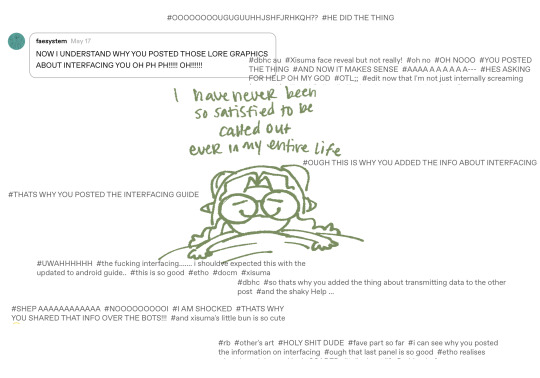
GLAD EVERYONE ENJOYED THE ANDROID INFO UPDATE ABOUT INTERFACING DFGJNDGKGNMXGHNCBNM
#dbhc#dbhc sillies#the shepherd#my sona#art escapades#IM DEAD#dbhc doc#dbhc etho#there was a point I was working on pt 6 and I realized I never. talked about it#and I was like oh my god only detroit fans are gonna. know#erm#I should really do something about that#THERE WERE A FEW PEOPLE WHO CALLED IT OUT BEFORE PT 6 EVEN DROPPED#LIKE#‘hm. interesting you added that last part. interesting. hm. hm.’ LMAO#glad it did it’s job#I wanted to emphasize in that post how like. NOT OKAY it is to force interface with someone#it’s very… idk if violating is the right word but I think it would feel very invasive/uncomfortable#if it’s not something you asked for yknow#ANYWAY IM INSANE#etho and doc WILL make up. eventually.#if I may. doc ‘no we aren’t telling anyone what happened. it’s not a threat to them anyways and this isn’t the first time I’ve replaced this#arm. it’s nothing the other hermits need to worry about’ 77#you better let xisuma comfort you. i dont know if it’s safe to have another guys trauma in your brain. you should get that checked out
260 notes
·
View notes
Text
DPXDC Prompt #94
Danny falls through a portal to the DC world from a natural portal that opened up while he was in mid fight with Skulker a fight that began at Vlads where the creep put a collar on Danny that kept him in ghost form, Vlad thought he’d force Danny to reveal his secret to his parents by taking away his human form. Looking around he’s in a dark city with dark smog colored skies. Unfortunately he’s stuck here as the portal closed leaving him trapped. He tried to find help but no one can see him in his ghost form. He starts tailing the vigilantes of this world and eventually follows one onto this space station through this tube (possessing inanimate objects sure comes in handy). He wasn’t expecting for the random British guy in a trench coat to see him.
#dp x dc prompt#dp x dc#dc x dp#danny fenton#danny phantom#writing prompt#poor danny#What if no one could see Danny like deadman#Danny is stuck in ghost form#Constantine has a headache especially from the ghost king that has apparently been tailing Batman for a week#ghost king danny#Batman had a feeling he was being tailed but it’s hard to prove when nothing is amiss#my asks are open#More Minty lore? Sure!#Honestly no one in my family knows I love Danny Phantom so I only own a glitch in time#It’s still my favorite show from the 2000s but at this point that probably has more to do with the phandom#I’d also like to reveal my DP inspired world soon but I have no clue how to go about it#Should I start a new blog? Or should I just post it here? This blog is meant for everything but I don’t want to bog it down#So that’s my rant take it or leave it but you can’t unread it!! Thanks for reading have a great day!
611 notes
·
View notes
Note
Not trying to be rude or anything but you shouldn't use the word 'manic' or 'manic period' etc. unless you actually have manic/depressive episodes because it downplays how severe those disorders can actually be. They're just words but unlearning harmful terminology like that can help destigmatise mental illness and I would hope youi would want to do that.
yeah it's almost like i used those words specifically because i DO understand how severe they are
#ramble#what's that post about how some people only see ideologies and concepts and not human beings#yes we should stop throwing terminology around like nothing but also#that is not the biggest problem neurodivergent people have right now#and also you're asking me to disclose my conditions to strangers so you can decide how i'm allowed to speak#also this isn't the point but i don't know anybody who uses the word 'manic' to describe their symptoms unless they have FELT IT#because it's. so specific and you do not use it unless you know what it means#for me a manic phase doesn't mean just a little energy buzz it feels like i'm on fire#anyway please don't waste your time sending me things like this because i don't like it#go after etsy shops who sell ocd merchandise not people talking about their own struggles
344 notes
·
View notes
Text
The TTPD Deep Dive (Part ?)
It’s no secret that I have a lot of Thoughts about The Tortured Poets Department and it has lived rent-free in my head since it came out earlier this year. I’m absolutely blown away by how underneath the chaos, it’s actually an exceptionally cohesive story and is probably the closest to a concept album Taylor has ever done.
There are so many themes that have stood out to me over the last five months, and there’s one in particular that I think not only drives the entire album, but ties into previous albums to help deepen understanding of it.
This is it, my fangirl magnum opus, my months of posts consolidated into one place. This is also my disclaimer that this is just my interpretation of the album, and my summary of the story it tells, and I don’t pretend to have any special insight or authority. I’m not saying I’m correct at all, do not take any of this as fact, it’s just what it sounds like to me, and these are my silly not-so-little thoughts about it.
(Under a cut because it’s way too long and involves discussion many may not care for or be sick of.)
Come one, come all, it's happening again (I'm thinking too hard about Taylor music)
The overarching theme in TTPD to me is: Grief. If you’re looking at TTPD as a story being told (instead of just as someone’s real life), the inciting incident of TTPD is loss, and the grief from that loss is what drives the narrator’s actions and the fallout, as well as unpacks those complicated feelings and how they apply to the her life in general. By the end of the standard album, it’s also about recovering from that pain, moving on from it and learning from it.
The loss specifically is the loss of the dream of having a family (with one’s partner). One thing that is abundantly clear both on the top line and under the surface in TTPD is how Taylor (as a person and as narrator) longed not only to for marriage but specifically parenthood, and the fear and then realization of losing that chance absolutely wrecked her— which is why the next lover’s (the conman's) wooing worked so well, because it preyed on that yearning. Yet that loss also dovetails into the grief of many things: of youth, of idealism, of relationships, of ideas, even of self, which causes almost a deconstruction of a belief system to piece one’s life back together by the end.
THE CONTEXT
TTPD weaves in the topics of marriage and motherhood both explicitly and in the subtext, in various forms and scenarios. The cheating husband in “Fortnight.” The wedding ring line in “TTPD” the song. “He saw forever so he smashed it up” in “My Boy Only Breaks His Favorite Toys.” All of “So Long, London.” Running away with her wild boy in “But Daddy I Love Him,” fantasizing about weddings and joking about babies. The imaginary rings in “Fresh Out The Slammer.” The cheating husband (again) and the friends who smell like weed or “little babies” in “Florida!!!” “You and I go from one kiss to getting married,” “Talking rings and talking cradles,” and “our field of dreams engulfed in fire” in “loml.” (And arguably: “I wish I could un-recall how we almost had it all.”) “He said he’d love me all his life, but that life was too short,” in “I Can Do It With A Broken Heart.” They may not sound like much on their own, but they paint a picture about how the topics pervaded her thoughts and her writing, and in many cases express her desires, and her pain.
It’s something that goes back several albums when you pick up on context clues. You get the first hints on Reputation with “New Year’s Day,” and “you and me forevermore.” Then Lover is very forward with it: “Lover” is basically wedding vows, “Paper Rings” is very engagement-coded, “I Think He Knows” is cheeky but low-key “you better put a ring on it,” “It’s Nice To Have A Friend” has wedding/marriage imagery in the last verse. As a self-professed diaristic writer, it’s the type of stuff one presumably doesn’t put out there unless those conversations have already happened, and she was very excited about it at the time it was released.
Then the pandemic happens and folklore comes out, and while there is still happy love there (“invisible string”), there are also the first indications that something has happened to put a halt to whatever future she once dreamed of (“hoax,” “the lakes”) and that she’s trying to reassure herself and him that it can still happen even if she’s scared it might not (“peace”). Notably, as far as I can remember it’s the first time Taylor explicitly brings up the idea of family (with her partner) with “you know that I’d give you my wild, give you a child,” which stood out at the time because it’s so incredibly vulnerable, but it’s even more poignant when you really take in that the whole song is like a confession of her deepest worries, and this is her vowing to give him these things that she holds most sacred if he’ll let her. These are what she cherishes most dearly and wants to return in kind: her youth and commitment (my wild), the family she craves (a child), unconditional support (swing for the fences/sit in the trenches) and understanding/compassion (silence that only comes when two people know each other).
Evermore follows an even darker path, and suddenly the album explores relationships that end and grappling with loss. There are toxic relationships (“tolerate it”), dangerous marriages (“no body, no crime,” “ivy”), failing/broken relationships (“Coney Island,” “champagne problems,” “happiness,” “‘tis the damn season”), as well as grief (“Marjorie,” “evermore”). Even some of the happy songs have uncertainty in them: in “willow” she’s begging for him to take her lead, like she’s still trying to decipher him and ask him to commit; in “cowboy like me,” still a beautiful love song, she’s thinking, “this wasn’t supposed to work and we were supposed to bail on each other but we fell in love instead”; “evermore” is about the depths of severe depression (and more) with the love story being the one saving grace in her darkest hour. And it’s also notable that after all the “fiction” writing, shortly after this album she writes “Renegade” where she’s telling the subject: I’m ready to start the next phase of our life now, why aren’t you? Is it me you don’t want after all? It’s like there’s something telling her that this stall might not just be a stall.
Midnights is a jumble (in a good, but in hindsight, also sad way) with the “sleepless nights” concept, but it seems pretty clear now that the themes and events and relationships she was revisiting tied into a lot of what she was feeling in her present life. I wrote the cliff notes version awhile back, but she’s questioning so much of her life that’s reflected in past events and relationships. Am I actually always the problem? How did we lose sight of each other and what we had? We only seem to work when we block out everyone and everything else. Can we ever go back to when things were good? Why are you neglecting me? I once thought I was going to lose everything but you saved me in the nick of time, can that happen again? I chased my career, but did I give up my chance at having a family in the process? Nobody knows what I really suffer from behind closed doors and I’m all alone.
And so on, which in retrospect now that we have TTPD, is very much what she was grappling with in private while writing and releasing the album. The inspiration behind the songs may have been different events and muses, but regardless of their origins they all end up feeling too familiar, like she's seen this film before (ahem). We’re seeing her view of commitment change too, or rather how she writes about it: she’s not making the outright declarations of it like on Lover, or even the implied ones on folklore, nor is she talking of the dark side of it like evermore. For the most part it’s a return to the early days of some relationships, before things got hard, or the end of them when there was nothing left, and also pushing away the discussion of it altogether by the outside world. “Sweet Nothing” is a sweet slice of life, but even at that, it’s the peace of the home in conflict with the pressure of the outside world. Now that we have “You’re Losing Me,” which was written at the same time as the rest of the album, we can probably deduce that she was going back to the start because something happened that made her doubt the future.
THE SETUP
So much of Midnights directly ties into TTPD, and I said in the post I linked that it’s like Midnights is asking the questions that TTPD answers. But there’s one song in particular on Midnights that sticks out to me as being key in the broadest sense to understanding the state of mind that led to the events of TTPD, and that’s “Bigger Than The Whole Sky,” because the way it expresses grief is reflected in the theme of mourning a life built and the dreams along with it that are never realized in TTPD. There are several instances in TTPD that are basically variations of: “every single thing to come has turned into ashes,” and that’s what makes her snap, and leaves her vulnerable to someone who promises her those things when she’s bereaved at losing them in the first place. (In other words: “the deflation of our dreaming leaving me bereft and reeling.”) The song tells a story about how that loss of hope colours one’s entire mindset, and in some ways is a bridge to TTPD to understand what such a low point feels like.
I think that that grief, and most importantly losing hope for an imagined future in its wake, is fundamental to understanding TTPD on so many levels: both the decline with one partner that kept her hanging on then led her such a dark path, and why she fell for the conman's apparent bullshitting because it offered an express pass to what she was losing with her partner. And I also feel like it plays a part into the ruminating she’s doing all over Midnights, trying to make sense of where she finds herself when she’s writing the album, which directly leads to “You’re Losing Me.” Loss permeates so many of the stories on Midnights: of lovers, of innocence, of youth, of faith, of control, of life’s work, etc. “BTTWS” is just one of the ways in which it is expressed so fully, capturing that deep depression and subsequent extinction of faith in something that once felt assured and very much wanted. (Which is also mentioned in her writing process in the “Depression” playlist on Apple Music.)
If you understand why that feeling of loss in general across so many parts of life is so important to Midnights, then it illuminates so much about the “narrative” in TTPD too. If on Midnights she’s wrestling with the seeds of grief and loss (on multiple fronts), TTPD is her reckoning with it in its full form. “So Long, London” is the song that is the most explicit about it: How much sad did you think I had in me? How much tragedy? Just how low did you think I’d go before I’d have to go be free? You swore that you loved me, but where were the clues? I died on the altar waiting for the proof. It’s the sequel to “You’re Losing Me.” It’s, the air is thick with loss and indecision, I know my pain is such an imposition, I’m getting tired even for a phoenix, all I did was bleed as I tried to be the bravest soldier, I’ve got nothing left to believe unless you’re choosing me, my heart won’t start anymore, but from the other side of the break.
This is highly speculative, but if you follow the thread about the topic and the relationship as told from Rep through TTPD, in broad strokes it goes: young love with a serious connection (Rep) -> growing up and making life plans (Lover) -> something happens that delays those plans or makes them grind to a halt (folklore) -> serious doubts arise and cause a loss of faith in their future (evermore) -> struggling with the loss of that future and trying to make sense of the problems in a last ditch attempt to save the relationship (Midnights) -> fallout from that grief after the blowup of the relationship (TTPD). Understanding that progression of events (through the music) explains not only the storytelling side of TTPD (e.g. the jump from the partner to the conman) but also how the experiences/muses blend in the music, and how the music that on the surface is about the short-term relationship is really driven by the destruction of the long-term one.
Following the music, it’s IMO implied that Taylor (the narrator) was holding out for marriage and family with her partner, for years, and it seems like it was at one point a shared dream until something happened to pump the brakes, and seemingly on her partner’s end. And extrapolating further, given how the sorrow expressed in former albums bleeds into TTPD, it sounds like a plan that had been concrete in some form before it had fallen apart, and losing something that once felt so tangible is what drives her in her grief to find any kind of respite from the pain. Which is why the situation with the conman becomes so appealing as the one with the partner splinters further and further.
(If everything you’ve once touched is sick with sadness and you don’t want to be sad anymore, what are you left to do?)
THE STORY
So (one part of) the story kind of sounds like this from the standard album: the relationship with her partner as well as his mental health slowly deteriorate and he withdraws emotionally (“London,” “Fresh Out The Slammer”) and physically (again, “London,” and “Guilty As Sin?”) and takes his resentment out on her (“London” and arguably “My Boy Only Breaks His Favorite Toys” even though I don't want to get into muse speculation here). As she sinks deeper into her own depression as a result, the weight of the failing relationship starts feeling like a cage— or a noose (“London,” “Guilty”), but coming to terms with the loss of their life together and the future they’d dreamed of was killing her (again, “London,” but also “I Can Do It With A Broken Heart”).
Enter the conman who she reconnects with at the very point where this is coming to a head (knowing that IRL she reconnected with him around the time Midnights was being worked on) , and if you read between the lines, she confides some deeply personal things to him (“Down Bad” and “hostile takes overs”/“encounters closer and closer,” “Smallest Man” and the entire sleeper cell spy imagery which is one of my favourite things and I could write a whole essay about the meaning of it, “loml” and “A con man sells a fool a get-love-quick scheme”). Then after she’s confided these secrets to him, he insinuates himself back into her life (“Guilty,” “Down Bad,” “Smallest Man”) and sells her a dream that HE can give her all these things she hopes for (again, “Down Bad,” “Smallest Man,” “loml,” song “TTPD,” “Broken Heart”).
But the thing is, he only knows these are the things she wants because she’s revealed it to him, and presumably, told him that was what she was losing by staying with her partner. And instead of the normal response of, “that is really sad that your partner is not supporting you and you deserve to be treated better,” to a friend in growing distress, it seems like it was, “well I can give you all those things!!!! Right now!!!! Trust me!!!!” And worked on her until she believed it, and jumped at the chance at a precarious time in her life. And one thing I want to underscore is: Taylor has agency in the situation always, it’s not like she’s been kidnapped and brainwashed. (In fact, she implores on songs like “But Daddy” that SHE is in charge of her own choices, good or bad.) She chose to rekindle the friendship and then relationship, and she chose to eventually leave her long term relationship for another man, and she reiterates on the album that she owns this all. But it’s also: nothing exists in a vacuum, and she makes choices based on emotions and information she has at the time, which is why it gives so much whiplash.
THE ALBUM
When you look at it as, the situation with the conman only happens because of what happened with the partner first and that the appeal of the conman and the fantasy he sells her is a direct reaction to that, it makes the “swirliness” of the music make so much more sense. And for much of it, even many of the “conman” songs on the surface are really “partner” songs underneath.
Fortnight
A suburban gothic allegory about a broken marriage with a distant husband with a wandering eye, which makes the rekindled romance with the neighbor so appealing. She’s miserable caged in her stifling house because she’s been abandoned by her spouse, so the reappearance of this past love reignites the passion that’s dead at home.
TTPD
“So tell me, who else is gonna know me?” “I chose this cyclone with you.” I’m gonna kill myself if you ever leave. Everyone knows we’re crazy. She’s laying it out there that she’s already in a dangerous state of mind, and she’s actively putting herself in more danger by pursuing the conman. “At dinner you take my ring off my middle finger and put it on the one people put wedding rings on, and that’s the closest I’ve come to my heart exploding,” spells this whole thing out so clearly: whether it’s an actual event (likely) or a metaphor for the promise he makes to her, the reason why it makes her heart explode is because it’s the thing she’s been waiting for forever with no movement, and here this person comes in and slips it on her finger in an instant like it’s nothing. (And eventually, as we’ll come to know, it is absolutely nothing to him.) You mean it could have been this easy this whole time?! (Well, no. Not until a certain other suitor makes his appearance later.) It feels like she’s finally getting everything she wanted in the blink of an eye! How lucky! How convenient! What was that about the get-love-quick scheme you say? (Unsaid: the reason why this feels so urgent is because there’s a sense that time is running out in so many aspects of her life and not just the obvious. Which reappears later on.)
Down Bad
“Did you really beam me up in a cloud of sparkling dust just to do experiments on?” sets the scene for this euphoric experience in the moment that starts to feel violating once the dust settles (which is then followed up in “Smallest Man” and the spy mission on her). The bridge spells out how he weaselled his way into her life, preyed upon (intentionally or not) her emotional state, sold her a dream and then vanished, without the benefit of hindsight yet we see later in the album.
The alien abduction metaphor is pretty brilliant, because it shows both how she was desperate to escape the place she found herself in, and how much it screwed her brain to then be left stranded when the affair was over. “[I loved your] hostile takeovers, encounters closer and closer,” is so evocative because it details how the situation came to be: his overtures under the guise of friendship blurred lines until he made her an offer that she eventually couldn’t refuse (hostile takeovers) as he infiltrated her life more and more intimately. The sad thing is that the song has parallels to how her relationship with the partner started too in earlier albums, in that they ran away to live in their own bubble (or planet) only for him to metaphorically abandon her as the years went on. (Oven, meet microwave.)
My Boy Only Breaks His Favorite Toys
Being continually emotionally broken down by a person who knows he’s hurting you but still acts the way he does. (The original voice memo version makes this even clearer and it’s rather heartbreaking.) “He saw forever so he smashed it up,” speaks to the loss of a future the person became scared of, and the original lyrics (“he saw forever so he blew it up”) somehow cut even deeper to me because it feels so much more intentional.
Also in the original version, “he was my best friend and that was the worst part,” also speaks not only to the loss of an entire partnership in the wake of this hurt, but also to the feelings of betrayal that the person you trust so deeply has the ability to hurt you in this way too, and how it’s a one-two punch of not only losing the relationship but also your closest confidant. (It’s like the sequel to “Renegade” and the missiles firing to me.) Again, there are shades of both/many situations in the song, pointing to an unfortunate pattern in some ways. The situation in “My Boy” is part of why she was so low, and why the “get love quick scheme” was so appealing later on. And it dovetails nicely into…
So Long, London
The most explicitly “partner” song that puts a coda on “You’re Losing Me,” and is Track 5 because it’s the emotional underpinning of how she got to where she was, and drives the events of the rest of the album. It spells everything out: He withdrew, she tried to fix it for both of them, eventually even that stopped working, he was oblivious to or minimized how badly she was suffering and his (in)actions couldn’t reassure her, he wouldn’t move forward on their future plans and stewed in his own struggles, she was spiralling out of control trying to hang on and ultimately felt like she was going to die if she didn’t leave.
But Daddy I Love Him
Like a direct reaction to “So Long, London” in that she breaks free from the death of one relationship and throws herself with reckless abandon to the next, fuck the haters. How dare you judge me, when the relationship you think I should have stayed in was killing me? (Dutiful daughter all the plans were laid. All you want is gray for me.) Fuck all of you, I’m going to choose whoever I want! (So what if I have a baby with HIM, huh?! I tried doing it the proper way and look where that got me so now we're back to square one) It’s again her imagining how wonderful and freeing this “wild boy” is going to be for her, and how wrong she’ll prove everyone. THIS TIME she definitely got it right. So what if she has to run away! So what if she scandalizes the whole town! They don’t know what she really wants or needs anyway! She’s the only one of her (hee-hee-hee) and she’s the only who gets to decides how this goes. (Because: she longs for control in a situation she’ll eventually realize she has little of it in, which we’ll find out is a recurring theme in her life.)
Fresh Out The Slammer
Also spells out what happened with the partner in the first verse and the pre-choruses, which is what makes the conman so appealing as the imagined jailbreak. The bitter loneliness vs. the sultry passion she builds up in her head as she awaits her release from prison is key to understanding the two sides of the story in the album. There’s this whole outlaw imagery (which is also carried through in “I Can Fix Him”), but it’s contrasted in the end with her and her reunited lover sitting on park swings like children with “imaginary rings” — because “Ain't no way I'm gonna screw up now that I know what's at stake.” What’s at stake is lasting love and the promises that come with it (marriage/family) that are precious and time-sensitive. The imaginary rings are both a nod to the youthful dreams of her and her new/old lover, but also has a double meaning to me because those promises aren’t built on anything together; they're made up, intangible. (They’re no more concrete than the plans that went up in smoke with the partner.) Like with most of the conman situation, it’s all a fantasy in her head that has yet to happen, and as we find out later in the album, reality ends up leaving much to be desired.
Florida!!!
Broadly speaking, it’s running away from your problems and wanting to disappear from your life. (But again: the life she’s disappearing from is the cheating husband she may or may not be feeding to the swamp-- another miserable marriage.) What kind of flies under the radar though is the “I don’t want to exist,” line, which points to her dire state of mind that led her to fleeing to that metaphorical timeshare down in Destin. In many ways about cheating death.
Guilty As Sin
Yes it’s the “masturbation song,” but again the nuance is that she’s left to pleasure herself because her partner has abandoned her emotionally and even physically, i.e. “my boredom’s bone deep.” To be blunt: they aren’t even intimate anymore, so she starts fantasizing about the guy she used to have chemistry with who’s reentered her life and is making moves on her. And realizing that she’s now finding release in another man (albeit imaginary) breaks her even as it reinvigorates her because she finally understands that the relationship she’s in is effectively dead. (“Am I allowed to cry?”)
Who’s Afraid of Little Old Me
This isn’t about relationships, but about society and its reaction to them in a general sense. But again, she’s left to stew in all this anger and hurt as she’s been abandoned at home, then abandoned by public opinion, and the public attack on her is part of the origin as well as the end of that story. The trauma inflicted upon her detailed in the song is the reason why she felt trapped in the first place, which led to the decisions she’s made and habits she’s leaned on ever since.
I Can Fix Him (No Really I Can)
This is one of the few songs that is the most completely conman-coded, and shows when the delusion finally breaks at the end of the song. She spends the whole song being like, “no really, I alone can make him better! You’ll see! I know he’s gross, but he’s mine! It’ll be fine I swear! You don’t know anything! Uuuuuum hmm wait actually what the fuck—“
Loml
Oof. THE song. Again the surface reading is about the “conman” who comes in and sells her the lie, but the pain is because all the dreams she writes about are HER dreams and implied that they were the dreams she built with her partner that the conman sold back to her. I could do a deeper dive on this but most of the song is applicable to both relationships, which not only shows the “swirliness” of her writing, but also how they both ultimately did the same thing to her in different shades.
The bridge and the last chorus are kind of fundamental to understanding it all, and her ending it with “you’re the loss of my life” is about, among other things, how falling for this trap blew up the life she built and dreamed of for good. (I could talk about this one forever.) “You shit-talked me under the table, talking rings and talking cradles” to “Our field of dreams engulfed in fire” is a hell of a line and progression, and again, indicative of what the real driving force behind the whole album is. The shit-talking is because he took her dreams (of marriage and children) and hyped it back up to her tenfold whether in a moment of his own delusion or for more nefarious reasons — much like how the man prior kept promising these things but never followed through, which left her vulnerable to someone who appeared to offer them enthusiastically. The field of dreams isn’t just the one with the conman, it’s the one with the longterm relationship she’d built the dream with in the first place, because the conman’s actions are part of the reason the LTR went up in smoke. (Not the reason for the rift, but the consequence of the final break.) And THAT is why it’s the loss of her life, so completely.
When she says “I wish I could un-recall how we almost had it all,” IMO it’s not just the fake future that the conman lures her into, but also (and perhaps mainly) the once-real one she had with her partner and the loss of which that made her susceptible to falling for the con in the first place. There’s honestly so much between the lines in this song that covers every theme and speaks to the grief of seeing the life she imagined slip away, slowly by the first man then annihilated by the second.
I Can Do It With a Broken Heart
The juxtaposition of “He said he’d love me all his life, but that life was too short” and “He said he’d love me for all time, but that time was quite short” sums it up to me (and parallels “loml”), because they are two different situations, but they cut her just the same. In the first, “that life” IMO was the life they’d built with the dreams that went along with it and it was too short because he never followed through, and in the second, the “time” was quite short because it was the frenzy of the whirlwind romance that fizzled as quickly as it began. The life that was too short led to the time that was quite short.
The Smallest Man Who Ever Lived
This is definitely THE conman song. The rage, the shame, the violation, it’s all in there. But the key to it is the bridge and the espionage imagery woven through it. A honeypot scheme is when spies target a mark and seduce them to gain their trust and their privileged information for their homeland. So her likening him to a sleeper cell spy who set her up just to mine her deepest secrets and use them against her is a heavy, loaded statement. And implied: that valuable information she unknowingly held were her longings of marriage and family (the aforementioned shit-talking about rings and cradles she never got to have), and more importantly, those dreams preceded him reentering her life and then beginning his mission on her.
The insinuation then is: she confesses these are her deepest wishes which are now seemingly unattainable in her current situation (e.g. with her partner) -> he convinces her HE will give them to her and make the dreams she pines for come true -> she falls for him and blows up her life to make it happen -> he gets what he wants (thrill of the chase/sex/the idea of her/whatever his intent was) -> he abandons her when he gets what he wants, or rather it isn’t what he wants or can handle -> she’s left a) all alone b) with dreams unfulfilled c) with no answers d) feeling used at having her most sacred wishes used against her.
Again, the song is unquestionably about the way the conman absolutely destroyed her, but he was able to do that because there was this thing she wanted more than anything, that was dying in her previous relationship, that he was able to prey upon to seduce her, then discarded her and her dreams as soon as it was inconvenient for him while absolutely hollowing her inside out. (And again: the devastating thing is that this also applies to other relationships she’s written about, in different ways.)
The Alchemy
Not about either the partner or the conman directly, but it (loosely) touches on her finding herself after the whole oven-to-microwave experience and opening herself up to life and love again. #GoodForHer
Clara Bow
This isn’t about the romantic relationships on the surface, but it is about how damaging the entertainment industry and public life are on women, and how women are only valued for their beauty as commodities until they can be discarded and destroyed in the process. Which I think plays into the circumstances that led her to make the decisions that she did years ago, and why she makes the ones she does now. (But also, being valued for physical traits and appeal for the male gaze brings us to…)
The Manuscript
The “original sin” that kicks off all of this. Again, at first light this isn’t about the partner or the conman, but the person it is about is the reason why she has made all the decisions she has ever since in relationships (and that’s Mr. Plaid Shirt Days from “All Too Well”). The realization that her first serious adult relationship is what cemented these patterns, and this view of herself and her worthiness in relationships, is profoundly sad. An older man who valued her for being so mature for her age and implying that the mature activities ahem associated with that were the performance benchmarks in her ability to carry a relationship, only to leave her, was earth shattering. She placed her faith in this person, but then the way he treated her changed her view of love and of herself.
She took his innuendo about “pushing strollers” as a sign of potential commitment, whereas he ultimately meant it as foreplay, and she was too young and naive to know the difference. So not only did she learn from that that this man (and men) didn’t view commitment and family the way she did and that it was something to be toyed with, but she also learned that her value to them among other things was sex. Imagine being an idealistic 20 year old and your boyfriend ten years your senior tells you, “if the sex is anywhere near as good as our dates have been, we’re going to be making babies before you know it,” (e.g. this is relationship is serious) and then he dumps you: does that imply that the sex was not in fact that good? (E.g. that you’re not worthy after all?)
No, obviously from this side of life, it’s because he was a commitment-phobic playboy, even if he did love her, but she couldn’t have known that at 20 and instead internalized that shame. But, it did send her on a path of how she approached sex and love and relationships for over a decade afterwards. And her coming to the realization that that first act of (perhaps unintentional) manipulation is what informed her actions thereafter helped her break the pattern. Her worth to men is not just sex, she has value and her hopes and dreams have value, she doesn’t have to change into a different person to please anyone, because if that is what they want, they won’t ever want her anyway.
It’s been described here on Tumblr by people more eloquent and astute than I as a song that encapsulates the album as this: one did it slow (partner), one did it fast (conman), and one did it first (first love)— and that is haunting. After years of men minimizing her dreams and desires, if not outright using them against her, she’s finally at the point where she can let it all go and move on for good. (There’s a whole other tangent about consent and shame and manipulation, but that’s an entirely different kind of discussion. But it is so devastatingly contrasted with “you said if we had been closer in age maybe it would have been fine, and that made me want to die.”)
THE SUMMATION
This is just my interpretation of it, but in going through the standard album, it feels pretty clear how cohesive the album is about a story of love and loss and grief, then reckoning with what caused it all in the first place that set a person on this path. It’s a formative experience at a young age that was traumatic and led to certain coping mechanisms and a shaping of one’s self-perception, as well as the reaction to external pressures that try to dictate behaviours and influence how one feels one deserves out of love which makes it harder to know when one absolutely deserves more and better. And leaves one struggling to cope with loss when there isn’t anything else to hold onto. Then in light of one’s life blowing up, learning to find oneself in the aftermath all over again.
On another tangent that is somewhat related to the theme of loss, the way she writes about the two main muses on the standard album also ties into how the situations converged to create absolute carnage on her emotional and mental well-being. With one situation, she’s talking about a concrete life that crumbles under the weight of their struggles; with the other, the entire thing is a fantasy that she builds up in her head, and when it comes to fruition it falls far, far short.
If you look at the “microwave” (conman) relationship, you realize that almost everything she writes about it happens before it actually becomes reality, and it’s mostly her imagining how great it’ll be, but with few exceptions, when she writes about what actually occurred, it doesn’t even come close to living up to her expectations. “Fortnight” is an imagined future where she escapes to Florida and his touch finally starts her stalled engine (ahem). “TTPD” is perhaps the most positive retelling of their time together, but even that implies he was better off stoned and when he sobered up he succumbed to his demons all over again, and more importantly she conveys how she also is in extreme distress, barely concealed by the veneer of being infatuated with him. (E.g. saying to that she’ll kill herself if he ever leaves her — the implication is that she is absolutely serious about it when she “felt seen.”) And that the warning bells are going off in her head, but she feels like this person is the only one she can be with (because they’re equally fucked up and the chaos he brings into her life makes her feel alive when she felt so close to death).
“Down Bad” is the most explicit about being in love, but she’s also left completely confused and disoriented by him disappearing, wondering if any of it was real and the seeds of violation creep into her consciousness (“did you really beam me up in a cloud of sparkling dust just to do experiments on?” “Waking up in blood.”). “But Daddy” is her imagining she can tell everyone to fuck off for telling her what to do with her life. “Fresh Out The Slammer” is her fantasizing about this man while feeling trapped in her relationship — but never in the song is she actually reunited with him; she’s using him as the projection of all the things she’ll make right after being wronged by her partner. “Guilty As Sin?” Is very obviously about her fantasizing about sleeping with him, but again it’s such a minefield for her because it hasn’t happened yet; they’ve only just reconnected. “I Can Fix Him” is the only song other than “TTPD” that shows them actually together, and it’s the one where she keeps saying, essentially, “I know he’s gross but I can rehabilitate him into an upstanding person, trust me,” until the mic drop at the end of the song where it finally hits her that no, she can’t, because this is who he is, not the person she’s built him up to be.
“Loml” is when it all comes crashing down, and the song emphasizes everything he did and told her, e.g. that she’s the love of his life, but she doesn’t return the sentiment in the song about their time together. Because now that it’s past tense, she knows it wasn’t actually love. (And says as much in the album epilogue poem.) “Broken Heart” is her reeling in the aftermath, but again, it’s “he said,” not “I loved.” And then there’s “The Smallest Man,” where she eviscerates him: he also pursued an idea of her but didn’t care much for the real her in front of him (who else is gonna know me?), he love bombed her only to hurt her (crushing her dreams), he was constantly stoned (and not just in the funny munchies kind of way), and he wasn’t even a good lover (despite the fantasy she’d created before). That last point is especially striking because she spent albums singing about the importance of and pleasure in (sexual) intimacy in the relationship with her partner (sometimes to both their own detriment) and how it was at times the only way they could connect, but in this case, the idea she hyped up and acted on in her head about this lover never panned out in practice. She spells it out in the epilogue: it wasn’t a love affair, it was a mutual manic phase.
In contrast, there’s a lot more tangible action in the “oven” (partner) parts of the album, showing how hard she tried to make the relationship work in real life instead of just in her head. All of “So Long, London” is her detailing how she tried to break through to him and support him, even when he rejected it and pushed her away, thinking she could carry them both until they ultimately sank, but she did it because she “loved this place for so long.” (The place? Not just the city, but the home and perhaps most importantly, him.) In “Slammer” she stayed with him even as things disintegrated for “one hour of sunshine.” (E.g. holding onto the rarer good times even as they were fewer and further between, hoping things would eventually turn around.) And like in “London,” she held on despite people in her life pleading with her that it was hurting her. (Which is also echoed in “Slammer.”) In “Guilty” her boredom is “bone deep” because the passion that once drove their relationship (and papered over their problems) has finally gone out too, so there’s nothing left to hold onto, leading to her fantasizing about the new suitor, which makes her realize her relationship has passed the point of no return. “Loml” is about the conman on the surface, but the undercurrent of all the things she says about him is that he was co-opting the dreams that she was clinging onto for dear life in the previous relationship, which is why the con is so painful; the field of dreams he sets ablaze isn’t just the fake painting he sold to her, but the original artifact (her life with her partner) too.
All the physical and emotional labour she puts into the relationship with her partner ends up reflected in the fantasizing she does in the one with the conman, which is why it is so confusing in the moment and so lethal when he leaves her without any answers. She wants to get married and start a family with her partner which keeps getting stalled; the conman mock-proposes which makes her think he’s immediately serious (“TTPD,” “loml”). She feels caged by having to hide with her partner and shrink herself; the conman promises he’ll stand by her side publicly and let her shine (“Smallest Man”). She sinks into a deep depression in her loneliness as the relationship with her partner careens off a cliff; the conman convinces her they’re meant for each other in a them-against-the-world way (“Down Bad”). The intimacy (in all senses of the word) in her relationship with her partner fizzles; the conman stokes the fire by sending her secret messages and reigniting passion (“Guilty”). She spent years trying to help her partner to no avail; the conman makes her think she has the power to reform him (“loml”). She feels misunderstood by her partner; the conman acts like he’s the (only) one who truly gets her (“TTPD,” “loml”).
In short: there’s nothing that the conman does or says that isn’t a direct response to what her partner did first, and it’s even worse because the conman knew how much her partner’s actions hurt her and he used that privileged information to paint a picture of what he could give her, but in doing so in some ways aimed at her heart with even deadlier accuracy. (I’ve likened it to him borrowing someone else’s life for his own joyride, until he crashes the rental car and flees the scene.) It’s why in the aftermath, the difference in emotions are so different: she feels nothing but rage and violation towards the conman for getting in her head and using her, whereas her feelings towards her partner are more complicated. There’s anger (at her lost youth and being taken for granted), but there’s also sorrow (at their lost life and future), disappointment (that he never could step up the way he’d promised or she’d needed), even compassion (towards his struggles) and a tiny measure of appreciation (for the good times they did share).
When you look at the bigger picture, the story the album paints is just so painfully normal. You have two people (Taylor and her partner) who once loved each other deeply, and despite warning signs early on telling them they have fundamentally different needs and ways of living their lives they fight like hell to make it work (the epilogue) until those warning signs become grenades that destroy their home (“My Boy,” “London,” “Slammer,” arguably “loml”). Having already been through at least one rough patch/break/breakup that she felt almost destroyed her (harkening back to Midnights on “You’re Losing Me,” “The Great War” and “Hits Different”), the final and fatal downward spiral of the relationship (“YLM,” “London”) and the grief over losing that future sends her into a tailspin, just at the time where a flame from the past (the conman) reenters her life and tells her all the things she’s been longing to hear and feel (“TTPD,” “Down Bad,” “Guilty,” “loml”) and, crucially, missing from the relationship that was once her entire life.
So in her panic, she falls prey to the (empty) promises of the past lover (“loml,” “Smallest Man”) and decides he’s actually what will save her from the free fall, because the alternative (that she will end up in a situation she doesn’t think she can survive) is too painful to bear. When she finally acts on these circumstances (leaves her partner/runs to the conman), she snaps, acting on pure emotion and adrenaline (“But Daddy”), but before she knows it, the new lover abandons her, and she’s left to reckon with the fallout of the episode and process everything that has happened (“Down Bad,” “loml”) — with the conman, with her partner, with the choices made in her adult life personally and professionally which leads her back to the moment she feels set her down that road at the start.
The TL;DR of this unintentionally long essay is that the reason the conman affair was so serious was precisely because it was meant to fulfill the promise of what was her life with her partner. To me, a large part of the story is that she projected that life onto the conman (or he projected her life back to her for his own purposes) because she wasn’t ready to deal with that massive grief and the life raft he offered felt like the only alternative to an even darker end. Whether the conman actually believed what he told her, or he went along with it or encouraged it because it served his purpose, we’ll never know, just like we’ll never know the finer details of what went on (nor should we). But no matter what, the album is just an extreme deep dive into all the ways grief can consume us, and whether it’s a long, drawn-out death or a sudden, inexplicable one, it can turn a person’s life into such a trainwreck that they act in ways unfathomable to even them, let alone the people around them. It can also unleash repressed trauma and mental illness that can crater your sense of self. And when those situations are compounded? It makes for a nearly impossible type of breakdown to unpack. (Which is why you might need a 31 song album to process it.)
#What if i told you I’m back lol#Time for me to finally just post the thing after it’s been sitting in my drafts for so long so I can rid myself of it lol#Writing letters addressed to the fire#the tortured poets department#Consider this a treat before Eras comes back for its swan song leg idk#Would you believe that as long as this is#i deleted quite a few chunks of it from the original draft i sent to a friend(s) in the interest of ~propriety~#Because they were a little too rambly and um— ~speculative~/personal/etc and we are flying too close to the sun#And i tried to be as tactful and more or less stick to things we can point to in the music and such#So hope people catch my drift lmao but also iykyk i guess#I have so many other themes I want to talk about but I never have any time#I have so much more i want to say and yet#wavesoutbeingtossed: The Anthology#Also if things get weird i will turn off reblogs/delete the post tbd#This is not an invitation to get into muse ranting or debate in my inbox and I ask that you please respect my boundaries :)#Midnights#lover#folklore#evermore
129 notes
·
View notes
Note
Apex predator, my ass. I’m going to pet the dog 🐻🐻❄️🐼
perhaps now is a good time for some responsible bear programming to remind everyone that as cute and cuddly as they may seem, bears are lethal apex predators and should absolutely be treated accordingly if ever encountered.
DO

NOT
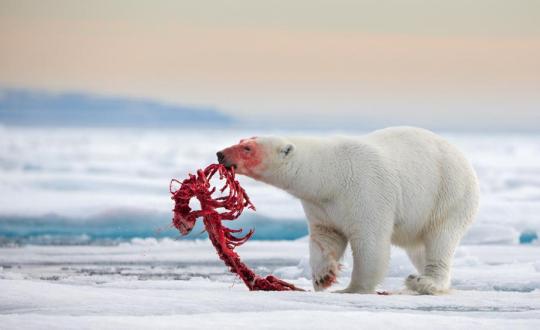
PET

#Responsible Bear Programming#^^ that's our tag for bears doing what they naturally do#if you do not like seeing bears behave as they naturally do -- as apex predators -- then please filter this tag accordingly friends#we are actually not accepting any complaints or suggestions about our tagging system or the content we post at the present moment#or at any point in the foreseeable future#so please don't try to comment or suggest otherwise#informative rant over now commencing educational rant#DO NOT try to pet the lethal beasts#you will be mauled and or killed#and then the bear will be killed for attacking a person#if you like bears the best thing you can do is ensure that they are not habituated to humans and do not view us as a source of food#either through your trash or through your flesh#keep yourself your neighbors and the bears safe by keeping human-bear interactions as minimal as possible#okay the team's done ranting now#(we're having A Day)#(it has a lot to do with the squirrels breaking into the floor of HQ and eating through our electrical wiring)#ask
689 notes
·
View notes
Note
Did Les ever dated in the past? Also is he with anyone recently?
Les quit school really early, like 10-years-old early, and he started working soon after, so he didn't really have friends his age. That kinda puts a buffer on a teenager's social and love life. Though there was something that happened at a house party once, that was, uh... a bad experience, and it left him with a lot of issues. Also, partially because of this, he's not really someone who acts on his crushes. So he never dated before.
But at one point the band spent a few months in the same location (dunno the reason yet, but maybe they weren't getting enough gigs and they had to take up some part time jobs for a while), and Les developed a crush on a bartender at a nearby club.
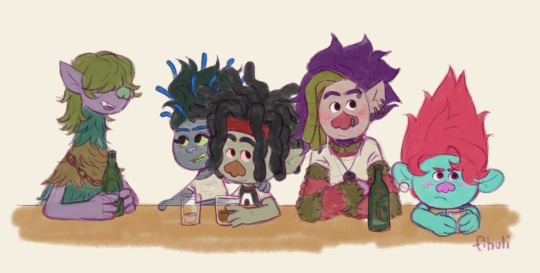
She's the only OC of mine who's visually a bigger weirdo than Les, and he definitely saw a little bit of himself in her, and hoping for someone with some shared life experience, it's what initially attracted him toward her and vice versa.
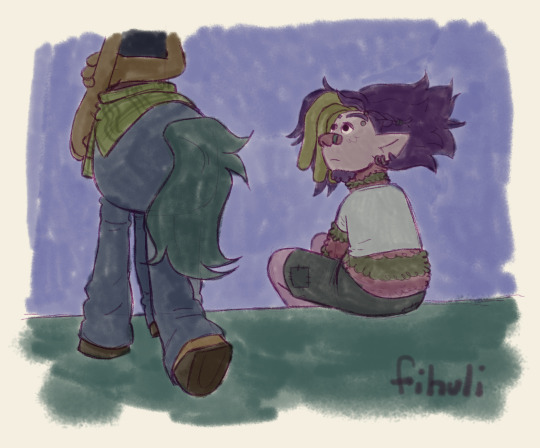
So they had a thing going on for a short time. It never developed into anything serious because sadly they are very alike, which means they are BOTH morons who are shy about making the first move. And after a while they came to the agreement that they were better as just friends.
Floyd with his persistent crush was not happy about the possible romance at first, but he ended up being happy for Les, and he finally decided to give his hopeless longing a rest, since the only good it was doing was growing a rift between his and Les's friendship.
Funny enough it was Floyd backing down which allowed the two to grow closer. Les lowered his guard since he no longer had to overthink if Floyd would interpret anything he did or said as some kind of flirting or act of love, and he no longer had to brace himself for any uncomfortable romancing coming from Floyd either.
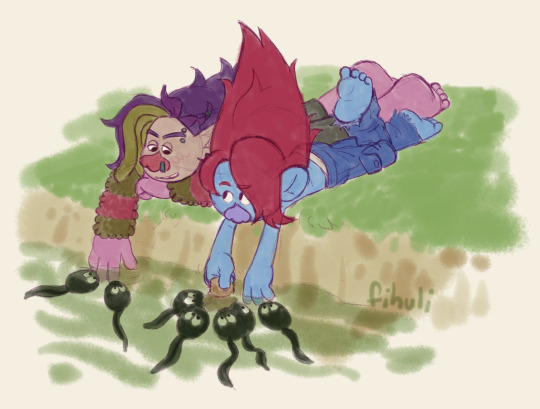
They were already good friends since the start but they became much more casual with each other and began to understand each other on a deeper level as years passed. As Floyd got older and more mature, and became an equal with the rest of the bandmates, it was actually Les who fell for him, hard. He didn't really do anything about it though, but Floyd eventually realized this and you know he did something about it. Though Floyd's crush had gone from looking at Les as this cool experienced older guy when he was younger to now seeing him as a shy innocent teddy bear compared to his lewd self ksjhdkjs.
So technically they became each other's first proper all-encompassing relationship. And by that I mean that besides the lovey-dovey obvious stuff, they were also best friends and helped each other grow a lot. Also Floyd by the time they got together, already started a habit of hooking up with strangers at parties, so being with Les forced him to slow down and progress through a relationship slowly and at a healthy pace for someone his age (since you can't really get anywhere with Les without a lot of patience). And Floyd got Les to become comfortable with opening up and talking about his deep-rooted feelings. They talked about issues they faced, many of which were related to Les's childhood trauma, instead of him just ignoring or suppressing it all. (Floyd also opened up about his own family trauma with Les obviously, but he talked about it even before they got together.)
The relationship, especially at the start, could still be considered questionable from an outsider's perspective, but so was the band's lifestyle in general. They were good for each other during that period while they were growing up and figuring themselves and each other out, which is what matters I think.
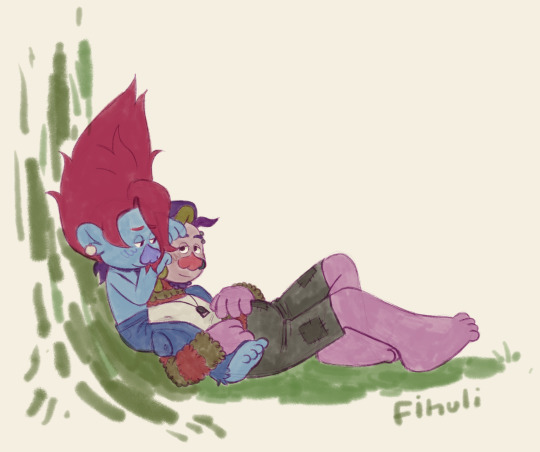
It was honestly mainly Floyd's undiagnosed bipolar disorder that made the relationship suffer toward the end of Floyd's days in the band. It created a lot of trust issues between Floyd and Les, and also Floyd and everyone else, heck it even made Floyd distrust himself, since he and none else knew or understood what was happening with him. This led to a lot of misery and anger that he mostly ended up directing at Les, and it was what eventually made them break up and Floyd leave.
#god damn it floyd's bpd at it again. what do i do with it. maybe i really should send him to therapy... 🤔#I know this answer is late but when I received the ask I was still developing the oc. whose name is Brook btw. i guess i forgot to say that#she is a sweetiepie and yes you will see more of her if you want#trolls#dreamworks trolls#ex bandmates#trolls floyd#trolls oc#les#brook#my art#answered#floyd in the first pic is feeling threatened lmao. bby you have no chance with him at this point go start your hoe career first#long post#floylie
165 notes
·
View notes